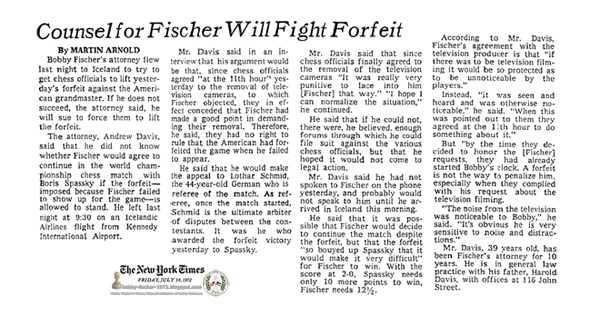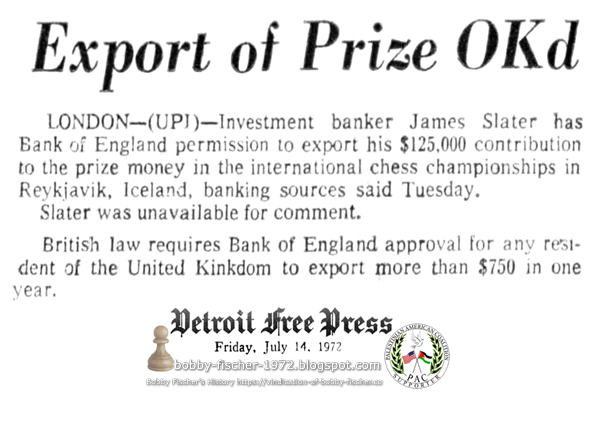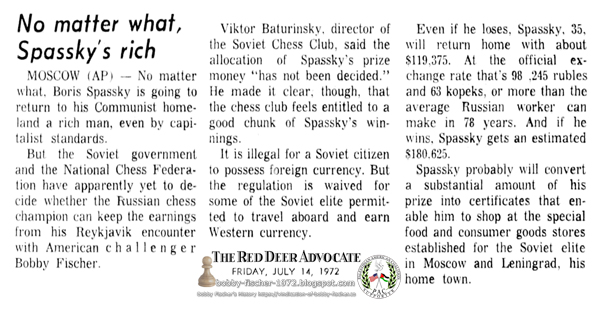New York Times, New York, New York, Friday, July 14, 1972 - Page 1-29
Fischer Stays Out, Forfeits 2d Game; Appeal is Expected by Harold C. Schonberg
Reykjavik, Iceland, July 13—Bobby Fischer remained in his hotel room today, refusing to show up for his scheduled game with Boris Spassky. He was declared the loser by forfeit and the score of this strange world championship chess match became 2 to 0 in favor of the Soviet titleholder.
Fischer's lawyer was expected here tomorrow to press for a reversal of the forfeit. He said before leaving New York that if chess officials refused to wipe the forfeit off the books he would sue to force them to do so.
Spassky appeared on the stage of the Exhibition Hall promptly at 5 P.M. Lothar Schmid, the referee, started Fischer's clock. According to Rule 5 of this match, a player who has not appeared on time has an hour to arrive after his clock has started. When the hour is up, his game is declared forfeit.
Spassky sat before the chessboard for about five minutes, looking uncomfortable, and then left the stage. The audience of about 1,000—less than half the capacity of the dimly lighted hall — watch the two empty chairs for an hour, with a sort of mesmerized fascination. There was no talking.
Fischer's clock kept ticking away. A projection of it was shown on the closed-circuit television screen, and the audience could watch the minutes slip by.
(Photo caption: (AP) Boris Spassky leaving yesterday after Bobby Fischer did not appear.)
When the hour had elapsed Schmid came to the front of the stage to announce that under Rule 5 Spassky was the winner by a forfeit. The 35-year-old Russian briefly appeared and was given a standing ovation.
“It is a great pity,” he murmured to Schmid.
Removal of Equipment
Fischer had refused to play unless all film and television equipment was removed from the hall. Then he added a demand that his clock be turned back. Schmid later said that under no circumstances could he had acceded to the second request. “There has to be some limit,” he said.
The rule of competition chess had already been bent to accommodate the American. One such accommodation was the two-day postponement in the originally scheduled July 2 start of the match.
During Fischer's sitdown there were frantic efforts to make him change his mind. The Icelandic grandmaster Fredrick Olafsson rushed to Fischer's room. A police car was standing by at the hotel, motor running. The Rev. William Lombardy, Fischer's second, was with him, urging him to play.
At the very last moment, Andrew Davis, Fischer's attorney, called from New York. He got in touch with Richard C. Stein, the attorney for Chester Fox, Inc., and proposed that the cameras be removed for this game only, pending further discussion. Chester Fox is the filmmaker who purchased film and television rights for the match.
No Time to Spare
Mr. Stein, who took the call at 5:30, while Fischer's clock was running, immediately agreed. He called Father Lombardy on a hot line that had been set up from Fischer's room to Exhibition Hall. But the point at issue now was the elapsed time on Fischer's clock. In any case, Fischer at best could have made it to the hall with only a few minutes to spare.
The American delegation did not even call back.
At 11:58 P.M., two minutes before the deadline for filing a protest, Fischer's aide, Fred Cramer, handed a formal written protest to Schmid. Cramer said Fischer had not seen the note.
[In New York, one of Fischer's attorneys said last night that two protests had filed in Iceland — one by Fischer and one by Cramer. They were based on what the attorney said had been a guarantee by Iceland that all television equipment would be “invisible and noiseless.”
[The lawyer, Paul G. Marshall, said he talked with Fischer by telephone at 10:30 last night. “Bobby has never allowed television on any match,” he said, “but for this match, he agreed. Iceland promised that he would not know there was filming taking place, so he could concentrate. In two inspections prior to the match, he was not shown the television equipment.”
The presence of cameras—one of them, with a crew of three, placed 15 feet from Fischer—rattled Fischer, Marshall said. “Bobby told me, ‘I can't think, it's a distraction.’” the lawyer added.
[Marshall said Fischer would make his appeal on grounds that Iceland had not adhered to the rules.]
Schmid said a tournament appeals committee would meet tomorrow on the matter.
[The Associated Press reported that Dr. Max Euwe, president of the International Chess Federation, said in the Netherlands that Schmid was still the arbiter, but that “if this situation continues,” the federation “will consider whether to step in.”
[“The limit has been reached and is even transgressed,” he was reported as saying.]
Problem of Tickets
The Icelandic Chess Federation has not yet determined what to do about the tickets sold for today's nongame. Presumably, said an official, refunds will have to be made.
If Fischer refuses to play any more games, the problem of the $250,000 purse will have to be considered. The winner is to get five-eighths and the loser three-eighths. There are also shares of other rights involved.
Will Fischer be entitled to any of it? No answer is yet forthcoming. Mr. Stein let it be known that Chester Fox, Inc., might consider putting an attachment on Fischer's share.
The Russians were not available for comment on today's nongame, but many chess enthusiasts were.
Fischer had objected to the television yesterday because, he said, it was noisy and it disturbed his concentration. Mr. Stein tried to discuss the matter with him last night.
([Mr. Stein wants to mislead the public into the wrong belief Fischer's complaint has directly to do with “cameras”… and for the public to be put under the erroneous impression those cameras ‘operate themselves’! On the contrary, the complaint could not be more emphatic as stated by Fischer: “...they had these characters there, who instead of having, some kind of video tape film that didn't make any noise, just, nobody around to operate them, just sort of stationless and they just had guys there with film cameras that were worrying, and they were all around me. Making a racket. A nuisance. Too much noise, and visually you could see them moving around.” - Robert J. Fischer, November 1972])
He said that he and the American delegation, consisting of Father Lombardy and Fred Cramer, were up all night trying to reach an agreement. They talked in one room, and the gist of the conversation was relayed by telephone to Fischer in the next room. Fischer never appeared. ([Can't blame Fischer, refusing to allow himself to be drawn into the Soviet drama, instead of studying and practicing his and Spassky's upcoming moves.])
It was suggested that Mr. Stein write a letter to Fischer, and he drafted one that urged the American challenger to reconsider his position.
“I can only express my admiration and appreciation for the elevation of chess in the eyes of the people of the [United] States, through your Herculean efforts,” he wrote.
“As a folk hero of the Americans,” he continued,“you must permit millions of Americans to share this experience with you in their homes” through television.
Mr. Stein explained to the American delegation that neither Mr. Fox nor the Icelandic Chess Federation would back down on television and film coverage. ([At what cost? Shoving a camera in Robert's face, fifteen feet away with a 3-man crew to disrupt Fischer's concentration and assisting the Soviet Union to win this tournament by default, through unfair advantage and unethical calculated off-the-board interference which Fischer never gave consent to?])
Mr. Fox had made a “substantial investment,” ([Whose choice was that? Not Fischer's and not Spassky's. Blame the Icelandic Chess Federation and their boss in Moscow, the slippery Soviets, who decided to “sell photographic and news coverage rights,” as an affront to constitutional liberty of a “free press” and chose instead out of greed to keep 100% of the take in profits. Supposing Chester Fox Inc., is to pay Iceland's expenses? The Icelandic Chess Federation is 100% to blame, and that's exactly how the Soviet wanted it, to come out of this fiasco with clean hands.]) and the Icelandic Chess Federation was counting on video and film proceeds to help out their deficit. ([Deficit. Bah!]) “Their entire financial structure depends on it,” Mr. Stein said. ([The Icelandic organizers are entirely to blame for poorly managing a fiasco they created. Not Fischer. When Australia offered $225,000 bid, it stated a paltry sum of $25,000 of the bid was needed to cover expenses. If Iceland could not afford to host the tournament, they should never have cast a bid! Clearly a breech of contract with FIDE and the two countries the challengers represent.])
In an effort to please Fischer, technicians this morning placed the film and television cameras in the wind tunnels adjacent to the stage. A four-inch hole was bored for each lens. Only one operator was to be at each camera ([Ooo, those disruptive camera MEN… characters which Fischer reports you could see, and hear them… a nuisance… “moving around”]), and to ensure additional quiet, the operator was not to wear shoes and not to carry coins or anything else in his pocket that might rattle or make noise ([Oh! So it wasn't actually the “camera” rattling, but rather coins and stuff, “rattling” in the men's pockets. By now, after the loss of two games, I think, Fischer has spoken and his patience worn thin with these Soviet characters.])
Fischer, who refused to visit the hall, then said that the mere presence of the cameras was enough to unsettle him. He wanted them off the premises. If he knew they were there, he said, that would be enough to bother him.
Many problems were created by Fischer's failure to appear. It was made clear by Schmid, however, that the match was still officially on, and that the same charade would be repeated Sunday, this time with the white pieces going to Spassky, as though a game actually had been played today.
According to the rules, Schmid said, the remaining games have to be started. If Fischer leaves the country, however, that would provide an excuse for declaring the match over. ([Which is exactly what the Soviet Union is aiming for.]) Or the central committee of the International Chess Federation could hastily convene for a special ruling to end the match.
“My stomach is churning,” said Schmid, looking less dapper than he has up to now.
New York Times, New York, New York, Friday, July 14, 1972 - Page 29
Counsel for Fischer Will Fight Forfeit by Martin Arnold
Bobby Fischer's attorney flew last night to Iceland to try to get chess officials to lift yesterday's forfeit against the American grandmaster. If he does not succeed, the attorney said, he will sue to force them to lift the forfeit.
The attorney, Andrew Davis, said that he did not know whether Fischer would agree to continue in the world championship chess match with Boris Spassky if the forfeit—imposed because Fischer failed to show up for the game—is allowed to stand. He left last night at 9:30 on an Icelandic Airlines flight from Kennedy International Airport.
Mr. Davis said in an interview that his argument would be that, since chess officials agreed “at the 11th hour” yesterday to the removal of television cameras ([the disruptive men operating said cameras]), to which Fischer objected, they in effect conceded that Fischer had made a good point in demanding their removal. Therefore, he said, they had no right to rule that the American had forfeited the game when he failed to appear.
He said that he would make the appeal to Lothar Schmid, the 44-year-old German who is referee of the match. As referee, once the match started, Schmid is the ultimate arbiter of disputes between the contestants. It was he who awarded the forfeit victory yesterday to Spassky.
Mr. Davis said that since chess officials finally agreed to the removal of the television cameras “It was really very punitive to lace into him [Fischer] that way.” “I hope I can normalize the situation,” he continued.
He said that if he could not, there were, he believed enough forums through which he could file suit against the various chess officials, but that he hoped it would not come to legal action.
Mr. Davis said he had not spoken to Fischer on the phone yesterday, and probably would not speak to him until he arrived in Iceland this morning.
He said that it was possible that Fischer would decide to continue the match despite the forfeit, but that the forfeit “so buoyed up Spassky that it would make it very difficult” for Fischer to win. With the score at 2-0, Spassky needs only 10 more points to win, Fischer needs 12½.
According to Mr. Davis, Fischer's agreement with the television producer is that “if there was to be television filming it would be so protected as to be unnoticeable by the players.”
Instead, “it was seen and heard and was otherwise noticeable,” he said. “When this was pointed out to them they agreed at the 11th hour to do something about it.”
But “by the time they decided to honor the [Fischer] requests, they had already started Bobby's clock. A forfeit is not the way to penalize him, especially when they complied with his request about the television filming.
“The noise from the television ([camera men crews]) was noticeable to Bobby,” he said. “It's obvious he is very sensitive to noise and distractions.”
Mr. Davis, 39 years old, has been Fischer's attorney for 10 years. He is in general law practice with his father, Harold Davis, with offices at 116 John Street.
The Gazette Montreal, Quebec, Canada Friday, July 14, 1972 - Page 2
Cameras Bug Him: Fischer Stays Away, Forfeits 2nd Match
Reykjavik, Iceland — (AP) — Bobby Fischer forfeited yesterday's chess game with world champion Boris Spassky. He stayed in his hotel room, because of disruptive cameras crew men in the playing hall.
His balk for the second in a 24-game schedule left the score 2 to 0 in the Russian's favor. This gave Spassky a powerful psychological advantage over Fischer, who has never beaten the champion.
Fischer knew before he came to Iceland to play for the world title that the match would be filmed. And Chester Fox, the promoter who owns the three cameras, said they were out of Fischer's sight and hearing. ([But this is not true. Fischer's lawyer states: “...if there was to be television filming it would be so protected as to be unnoticeable by the players. ... one of them, with a crew of three, placed 15 feet from Fischer.”])
“He said just knowing they were there bothered him,” Fox said, adding later: “I pity the poor guy.”
All attempts to get Fischer to the chess table — where he lost the first game to Spassky Wednesday — proved futile.
The future of the match, said chief referee Lothar Schmid, now depends on whether Fischer persists in his walkout.
SUNDAY GAME
Schmid said that International Chess Federation could intervene and disqualify the American challenge, allowing Russia to keep the world title it has held for 24 years. But at the end of the day, Schmid said there would be a game Sunday as scheduled.
The row over the cameras began early yesterday when Fischer said he couldn't play alongside them in the 2,500-seat Sports Palace. Fox, whose purchase of television and film rights for the match allowed the Icelandic chess federation to offer a record $125,000 in prize money ([which the persist in claiming they can not afford to pay… compared to Australia who made the generous bid of $225,000 and confirming a paltry $25,000 only was necessary to cover expenses. Why is Iceland sorely mismanaging their funds and running into such financial problems that neither Australia, Mexico or Argentina appeared to experience?]), said the cameras had to stay.
In an attempt at compromise, Fox's lawyer Richard Stein sent Fischer a letter at 5 a.m. appealing to him to at least talk about the problem.
“As a folk hero of the Americans, you must permit millions of Americans to share this experience with you in their homes, for the benefit of chess and for the benefit of the rest of the world,” Stein's letter said.
IGNORED IT
Fischer ignored the appeal. Ten minutes before the match was to begin, Fred Cramer, a U.S. Chess Federation official, called the match organizers to say Fischer wasn't coming.
Spassky entered the hall on time and took his place at the table. At game time, Schmid started Fischer's clock as the rules required. Spassky looked perplexed.
At the end of an hour, Schmid announced to an angry crowd: “Ladies and gentlemen, Mr. Fischer did not appear in the playing hall. According to Rule No. 5, if a player is more than one hour late he loses the game by forfeit.”
During the hour there were telephone calls back and forth between the Sports Palace and Fischer's hotel.
Spassky, who left the stage at times, emerged from behind the curtains after Schmid's announcement, bowed to the crowd and left.
NOT FIRST
It was not Fischer's first complaint against the ([disruptive men operating the]) movie cameras. Shortly after play began Wednesday, he walked out for 30 minutes, complaining that one of the cameras made him nervous ([according to Golombek, one of these disruptive camera men were crawling around on the roof, and that got Fischer's attention and distraction. According to Schonberg of the New York Times it was camera men at the side of the stage. According to another reporter, the disruptions were coming from the back of the hall. According to Fischer, “…they had these characters there, who instead of having, some kind of video tape film that didn't make any noise, just, nobody around to operate them, just sort of stationless and they just had guys there with film cameras that were worrying, and they were all around me. Making a racket. A nuisance. Too much noise, and visually you could see them moving around.”])
During the walkout Schmid told Fischer nothing could be done about the ([disruptive men operating the]) camera.
Film and television rights for the match were sold to Fox. Fischer and Spassky were to get a share of the proceeds, estimated at $27,500 each.
Stein said he had been up all night with Fischer's second, Rev. William Lombardy, and Cramer, trying to settle the question.
The cameras had been officially sanctioned. Under Rule 21, the taking of pictures during the match by official photographers is allowed as long as cameras are “neither visible nor audible.” ([Which, as Fischer's lawyer points out during interview, “Bobby has never allowed television on any match,” he said, “but for this match, he agreed. Iceland promised that he would not know there was filming taking place, so he could concentrate. In two inspections prior to the match, he was not shown the television equipment.” Marshall said Fischer would make his appeal on grounds that Iceland had not adhered to the rules.”] But the Soviet Union doesn't care if a breech of verbal or written contract occurs, just as long as they can force a default and retain the title.)
Austin American-Statesman Austin, Texas Friday, July 14, 1972 - Page 1
Fischer's Chess Appeal Rejected by Officials
Reykjavik, Iceland (AP)—An appeals committee rejected today Bobby Fischer's protest against his loss of Thursday's world championship chess game by forfeit.
The four-man committee supported the decision of chief referee Lothar Schmid to award the game to Boris Spassky because Fischer failed to appear ([in protest to disruptive camera man such as the disruptive man operating a camera, present on the roof reported by Golombek; camera men from the side of the stage according to Schonberg of NY Times, while other reporters state Fischer's complaint was in relation to disruptive camera men located at the back of the hall, among other locations described and varying number of camera operators, Fischer's lawyer also reports a 3-man crew was posted 15 feet away from Fischer, within plain view, and heard by the contestants. According to Fischer, “…characters there, who instead of having, some kind of video tape film that didn't make any noise, just, nobody around to operate them, just sort of stationless and they just had guys there with film cameras that were worrying, and they were all around me. Making a racket. A nuisance. … Too much noise, and visually you could see them moving around.”])
The decision left Fischer two games down in a 24-game match where Fischer needs the equivalent of 12 victories and a draw to take Spassky's title.
Andrew Davis, Fischer's lawyer who arrived this morning from New York, was in the anteroom when assistant referee Gudmundur Arnlaugsson of Iceland announced the forfeit would be maintained.
Asked if his client would play the next scheduled game on Sunday, Davis replied: “I can't comment on that.”
Davis, who appeared upset at the ruling, said he had not seen Fischer since he got here.
Fischer stayed in his hotel room Thursday and refused to play unless three cameras ([operated by disruptive men]) filming the match for movie and television sales were removed from the hall. Since the American challenger lost the first game on Wednesday, referee Lothar Schmid's forfeit ruling gave Spassky a 2-0 lead. ([Because cheating, breaking their word on the guaranteed ‘filming would not be disruptive, or detected by either of the contestants’ and then publishing misleading reports in U.S. newspapers to cover up their misdeeds, yet Schonberg and Golombek certainly report “detecting” two separate locations of disruptive camera men. But disrupting Fischer's concentration is now the only hope the Soviet has of surviving this tournament.])
Schmid said the third game of the 24-game match would be held on schedule Sunday, but the future of the match was very much in doubt.
Schmid said it depends on whether Fischer continues his boycott. He added that the World Chess Federation — FIDE — could step in at any time and disqualify him. But Dr. Max Euwe, president of the organization, said Schmid was still in charge of the match and must decide how to handle the American. ([Try forcing the Icelandic Chess organizers and the Soviet organizers to OBEY THE RULES.])
A spokesman for promoter Chester Fox, who bought the movie and TV rights for the match from the Icelandic Chess Federation ([a highly unconstitutional unlawful thing, done in the shadows by Icelandic and Soviet organizers and Moscow's blessings, but publicly denied, because it overtly accomplished burying coverage of the humiliating defeat of the illusion of Soviet supremacy]), said the cameras had to stay because “the whole financial structure of the match depends on it.” ([Then Iceland should return the unethical Chester Fox money, declare the arrangement null and void, and fulfill its financial obligations to FIDE and the two representative nations of Spassky and Fischer. That is, Australia bid $225,000 with only $25,000 going to organization expenses and yet, said nothing of deficits. If Iceland is claiming it is suffering with “deficits” this early in the game, it is evidence that it could not afford to host the venue and should never made a bid. Perhaps they could loosen their grip on those gate receipts…]) It was the prospect of movie and TV sales that allowed the Icelanders to offer a record $125,000 ([and an unethical excuse to keep 100% of the gate receipts and profits, for their financial investors]) purse to the two players, and Fischer and Spassky are also to divide a share of the ([paltry]) movie-TV money ([dividing between two men]) an estimated at a minimum of $55,000.
Fox said Fischer admitted he couldn't hear or see the three cameras ([this is patently false. Fischer's lawyers confirm Fischer could see and hear the disruptive men operating the cameras, as well as Mr. Schonberg (NY Times) and Mr. Golombek, the disruptive camera men were visible and audible, but Fox is attempting to cover up his misdeeds, and following Fischer's boycott of the second game, Fischer changed his mind and said he wanted all cameras and the men operating them OFF the premises. When Fox' and Stein and ilk tried to persuade Fischer further, Fischer refused, saying now, after a loss of 2-0 thanks to disruptive camera men,]) but “he said they bothered him because he knew they were there.” ([So Fischer has spoken. No more cameras, the rest of the match. Fischer is now tired of playing the Soviets' mind games.])
Fischer had objected first to the cameras Wednesday night and left the chess board in the sports palace for half an hour before conceding defeat in the first match. Intense negotiations through the rest of the night and all day Thursday failed to coax him from his hotel room.
“We did everything we could,” said Richard Stein, Fox's lawyer. He even sent a letter to Fischer urging him to discuss the problem ([that Fischer was not told the truth? Not even shown the camera equipment or the disruptive camera operation crews … men that would be seen moving around and heard during the match, prior to the opening. The problem of being greviously misled? and then try to brush it under the rug in reports published across the sea in U.S. newspapers? Misleading readers in America to wrongly assume the Fischer's complaints were against “inanimate cameras” that presumably, “operate themselves” by carefully omitting mention of the 3-man crews operating some of them]) He wrote: “As a folk hero of the Americans, you must permit millions of Americans to share this experience with you in their homes, for the benefit of chess and for the benefit of the rest of the world.”
Fischer didn't budge, and five minutes before the starting time a U.S. Chess Federation official, Fred Cramer, telephoned that Fischer would not appear.
Spassky had arrived meanwhile and was seated behind the black figures before a crowd of about 1,000, or less than half the capacity of the sports palace.
The white pieces, and with them the first move, were Fischer's as the loser of the first game. At 5 p.m., the scheduled starting, Schmid started the playing clock. When the hour time limit for the first move by Fischer passed, the referee announced:
“Ladies and gentlemen, Mr. Fischer did not appear in the playing hall. According to Rule No. 5, if a player is more than one hour late he loses the game by forfeit.”
Spassky was given a standing ovation as he left the hall.
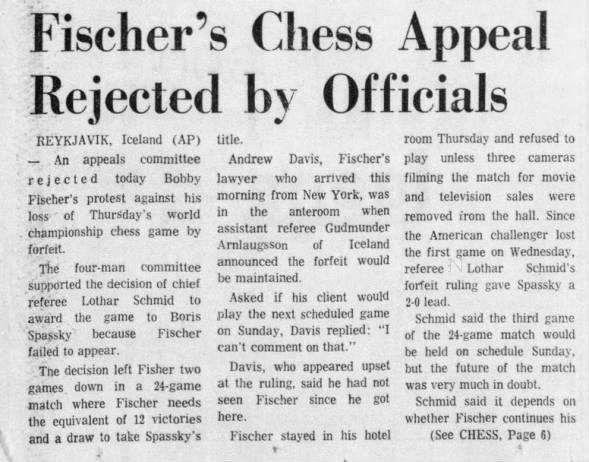 Fischer's Chess Appeal Rejected by Officials 14 Jul 1972, Fri Austin American-Statesman (Austin, Texas) Newspapers.com
Fischer's Chess Appeal Rejected by Officials 14 Jul 1972, Fri Austin American-Statesman (Austin, Texas) Newspapers.com
The Odessa American Odessa, Texas Friday, July 14, 1972 - Page 4
Chess Match May At End by Isaac Kashdan
The forfeit by Bobby Fischer in the second game of the world championship chess series with Boris Spassky probably signals the end of the long-awaited encounter.
The dispute regarding the ([disruptive operators]) of the television cameras was the latest in a long series of ([entirely avoidable from the Icelandic/Soviet end]) controversies that has plagued the match organizers for months.
With a two-point deficit, it is not likely that Fischer will take his seat for the third game, set to begin in Reykjavik at 5 p.m. Sunday. If he does not appear, he will most likely be disqualified by the International Chess Federation, rather than go through a forfeit procedure in each game.
If he does continue, Fischer will need 12½ points of the remaining 22 games. Spassky would retain the championship with 10 additional points.
The match almost came to a halt before it started on July 2, the originally scheduled date for the first game.
Fischer had the right, however, to bar the cameras if he felt they were disturbing his concentration.
This was asserted today by Lt. Col. Edmund B. Edmondson of Newburgh, N.Y., executive director of the U.S. Chess Federation, who had a hand in drafting the agreement.
Fischer's two attorneys in Iceland, Paul Marshall and Andrew Davis, both of New York, have been consulting with legal experts with a view of possible action in Icelandic courts.
Caption: Waiting For Fischer—Soviet chess master Boris Spassky waits silently for the arrival of Bobby Fischer as their first match was to get underway in Reykjavik, Iceland on Tuesday. Fischer forfeited his chess game Thursday by failing to appear at the playing hall. Fischer boycotted the game because he objected to the presence of ([disruptive men operating]) movie cameras in the hall. AP Wirephoto.
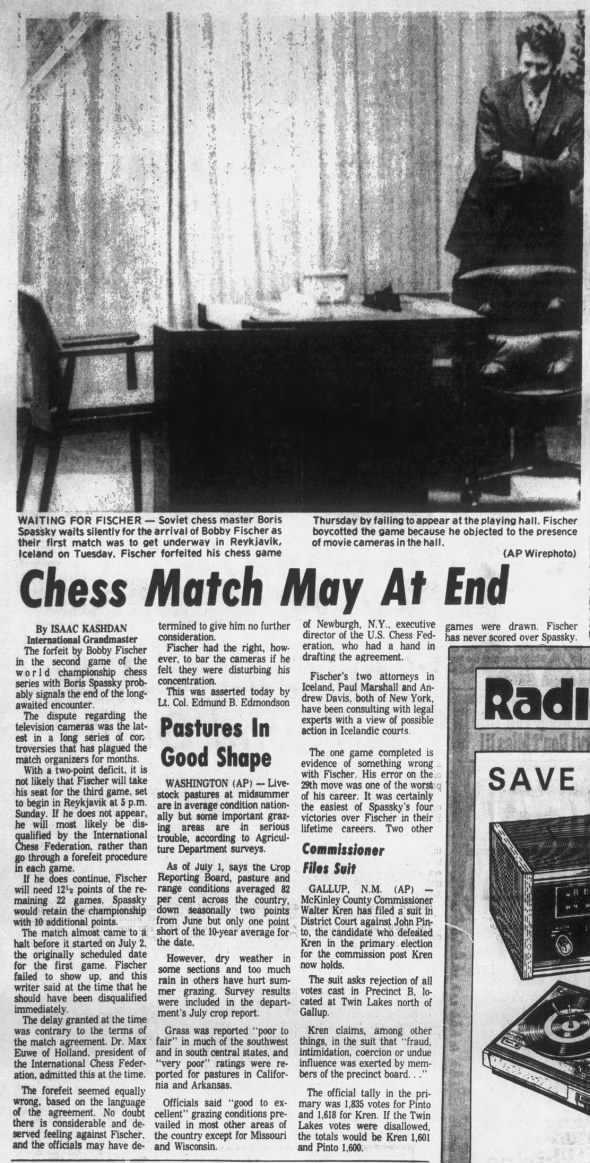 Chess Match May At End 14 Jul 1972, Fri The Odessa American (Odessa, Texas) Newspapers.com
Chess Match May At End 14 Jul 1972, Fri The Odessa American (Odessa, Texas) Newspapers.com
The Windsor Star Windsor, Ontario, Canada Friday, July 14, 1972 - Page 13
Fischer Charges Conspiracy As He Forfeits Second Game by Ian Westergren
Reykjavik, Iceland (UPI) — Charging there was “a conspiracy against me,” ([Well, yeah, Master Bob, they sure are “conspiring” against you every time they publish another misleading article in U.S. papers, claiming your complaint was against inanimate cameras, and never, but once or twice mentioning a man operating said cameras, was actually involved. And yeah, sure, the whole plot to stage the venue in Reykjavik, next door to the Keflavik NATO base, which the Soviets desperately want removed, a point of contention, to rabble-rouse Anti-American hysteria among disgruntled pro-Soviet Icelanders… and even Col. Edmondson of the USCF says that if you wanted the disruptive camera operators ousted, the Icelanders should've complied… but they were so busy conspiring with Soviets, to disrupt your concentration to keep the title by default; so many wrongs, in so little time, so, yes, you are at liberty to regard their peculiar behavior as “CONSPIRING” against you, and of course I'm only scratching the tip of the Iceberg of "behind the scenes problems" covered here over the past several months, straight from the newspapers!; Soviet double-talk, backpeddling and underhanded schemes]) U.S. grand Master Bobby Fischer locked himself in his hotel room Thursday and refused to come out for the second game of the $250,000 world championship chess match, forfeiting the game to Boris Spassky of the Soviet Union.
Despite last minute attempts by organizers to get him to the hall before the 6 p.m. (2 p.m. EDT) deadline, Fischer refused to listen and turned off his telephone.
Aides said the unpredictable chess genius stayed in bed to protest the presence of ([disruptive camera men operating]) cameras in the contest hall.
He later allowed an old friend, ([couldn't be that close of an old friend, since Olafsson was rooting for the Soviets]), Icelandic grand master Fridrik Olafsson, into his hotel suite.
“Talk to me about just about everything else but the match” Olafsson quoted Fischer as saying. “I am not interested in it any more. In fact, I lost interest already six months ago.”
The American camp announced four hours after the game that Fischer was filing an official protest against the decision to give Spassky the second game.
Fischer's spokesman said they would protest on the grounds the clock was started before the playing conditions were in proper order. They said Fischer felt the arbiter had violated the rules of the International Chess Federation (FIDE) and would ask the match committee to cancel the results of the game. Under the rules they have 12 hours to make a decision.
Icelandic chess sources quoted Fischer as saying he was not only protesting the ([disruptive men operating the]) cameras but also the fact that “there is a conspiracy against me here.” ([Naturally, since Iceland is a hornet's nest of Anti-American chauvinism and racist to the point the Icelandic government made secret agreements with U.S. Government to forbid, and by 1972 strictly limit the number of black service men entry to the NATO base… there was a lot of conspiring going on there against Americans. That's why the Soviet Union selected Iceland. The fact that the professional class supported Hitler during WWII doesn't seem to raise any concerns from the USSR.])
The forfeiture put Fischer, 29, two games down in his attempt to wrest the championship from Spassky.
Judge Lothar Schmid of West Germany announced the forfeiture when Fischer, playing the white pieces, failed to show up within the allotted hour to make the first move of the second game.
“Lades and gentlemen,” Schmid said, “according to rule five of the Amsterdam regulations, Robert Fischer has lost the game.”
The announcement drew applause from Icelanders in the hall.
Fischer's aides say he never signed the Amsterdam regulations, set up prior to the match to govern its play.
Fischer said after his defeat in the opening game Wednesday that he would not play unless all television cameras ([the disruptive men operating them, some in crews of up to three men apiece! and placed a mere 5 meters from Fischer]) were removed from the hall.
Negotiations between the organizers and Fischer's representatives went on throughout the day Thursday in an effort to resolve the impasse.
Representatives of Chester Fox Inc., the firm that bought exclusive television and picture rights to the match, took part in the negotiations. They offered to compromise with Fischer's demands by removing one of their closed circuit television cameras and relocating the others so they would not disturb the challenger. ([But since Fischer is now 2-0 because of the disruptive camera men, why would he feel in a mood to compromise with the all-too-obvious Soviet clowns?])
The proposed compromise was not enough.
Spassky, 35, arrived about two minutes before the scheduled start of the second game. He and Schmid walked slowly around the stage waiting for the challenger. The audience sat silently in the hall watching the empty black swivel chair that Fischer had flown in from New York for the match.
Spassky went backstage at one point, then returned and studied the flower arrangements and other decorations.
The Russian, dressed in a black and white jacket, beige trousers and red tie, appeared calm and relaxed.
Schmid then started the game clock on schedule at 5 p.m. (1 p.m. EDT), signalling that the American challenger had one hour to show up and make his first move.
Schmid and Fischer were engaged in a dispute of their own. The judge demanded an apology from Fischer for calling him a liar Wednesday when he tried to convince the challenger to return to the first game.
The incident occurred when Fischer interrupted his play in the game for 35 minutes to protest the presence of the cameras ([our reporter means the disruptive Spider man with a camera dangling around on the roof, according to Golombek, and also the disruptive camera men located at the side of the stage, as reported by Schonberg of the NY Times. Crews of disruptive men… operating the cameras. Wouldn't want to mislead readers would we?]). He later returned, but conceded the game to Spassky on the 56th move when he saw he had no way to prevent the Russian from turning his remaining pawn into a queen, the most powerful piece on the chess board.
Caption: IN WAIT OF FISCHER — Soviet chess master Boris Spassky waits silently for the arrival of Bobby Fischer Tuesday as their first match was to get under way in Reykjavik, Iceland. Bobby Fischer forfeited his chess game Thursday with Spassky by failing to appear at the playing hall. Fischer objected to the presence of ([disruptive crews of men operating]) cameras in the hall.
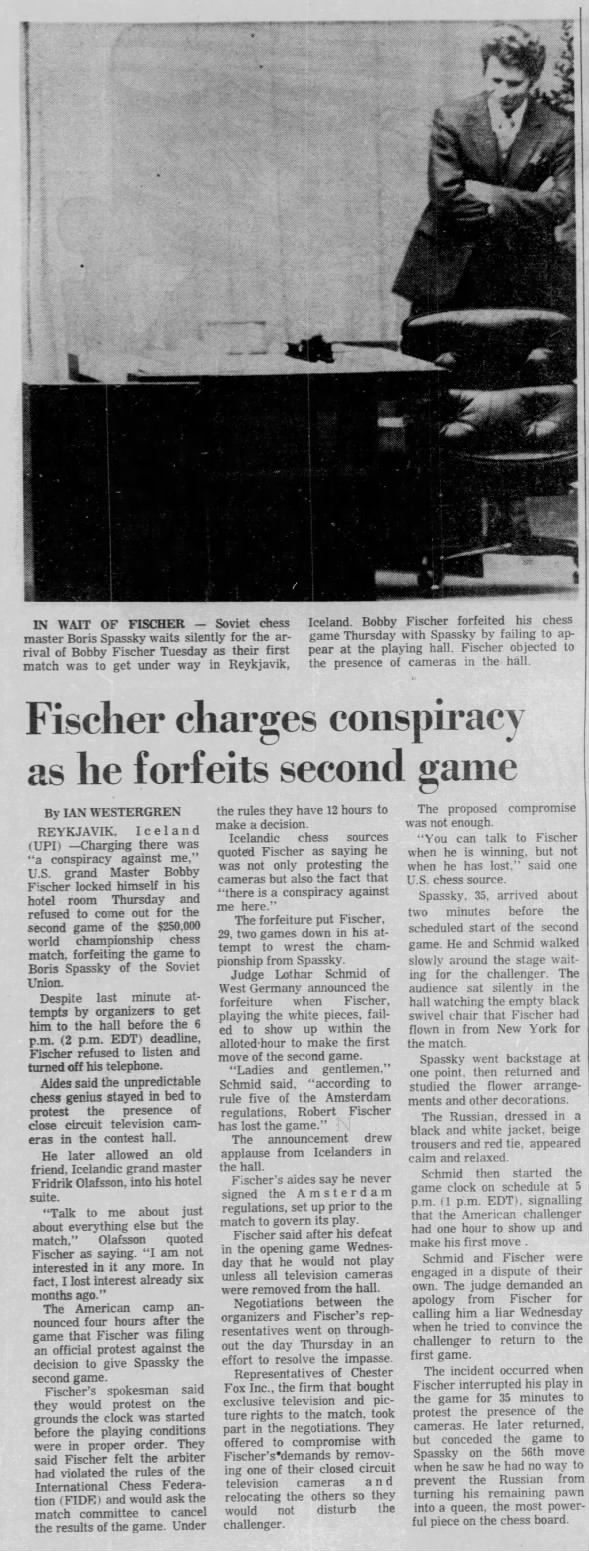 Fischer Charges Conspiracy (Iceland Is Very Anti-American and Soviet Conspired to Pick It) 14 Jul 1972, Fri The Windsor Star (Windsor, Ontario, Canada) Newspapers.com
Fischer Charges Conspiracy (Iceland Is Very Anti-American and Soviet Conspired to Pick It) 14 Jul 1972, Fri The Windsor Star (Windsor, Ontario, Canada) Newspapers.com
The News and Observer Raleigh, North Carolina Friday, July 14, 1972 - Page 3
Soviet Chess Master Boris Spassky Waits in Vain While Fischer Boycotts Disruptive Camera Men
Soviet chess master Boris Spassky waits in vain for Bobby Fischer in Reykjavik, Iceland.
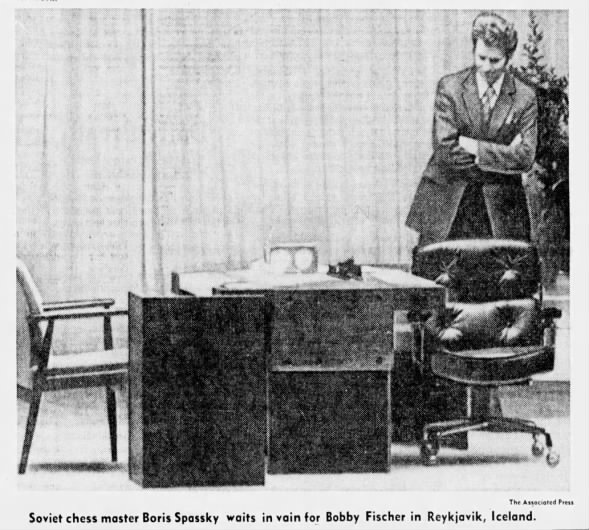 Soviet Chess Master Boris Spassky Waits in Vain While Fischer Boycotts Disruptive Camera Men 14 Jul 1972, Fri The News and Observer (Raleigh, North Carolina) Newspapers.com
Soviet Chess Master Boris Spassky Waits in Vain While Fischer Boycotts Disruptive Camera Men 14 Jul 1972, Fri The News and Observer (Raleigh, North Carolina) Newspapers.com
Reykjavik, Iceland, July 14, 1972. Victor by Forfeiture - Boris Spassky of the U.S.S.R. leaves Laugardalsholl hall in Reykjavik, Iceland, Thursday after Bobby Fischer failed to appear for the second game of the world chess championship match. Fischer's forfeiture gave Spassky a 2-0 lead in the scheduled 24-game match. All attempts to get Fischer to appear at the chess table failed, incuding an appeal based on his responsibility as a 'folk hero of the Americans.' The next game is scheduled for Sunday. (AP Wirephoto via cable from Reykjavik)
The Decatur Herald Decatur, Illinois Friday, July 14, 1972 - Page 3
Looking Like a Young Bobby Fischer
Depending On personal taste, youngsters could select quiet contemplative or raucous slapstick sport at Thursday's Play Day held in Hess Park. Danny Bartels, 10, middle, in top photo, chose to concentrate on chess, looking like a young Bobby Fischer, would champion chess player. Watching Bartels' deliberate moves are John Peters, 12, left, and Betsy Garren, 11, right. ★
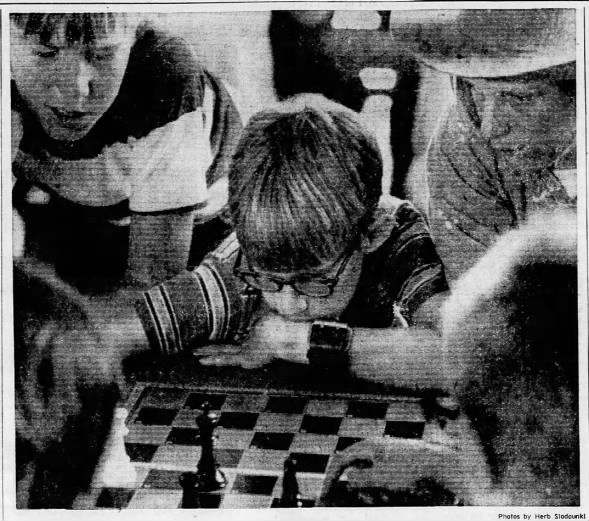 Looking Like a Young Bobby Fischer 14 Jul 1972, Fri Herald and Review (Decatur, Illinois) Newspapers.com
Looking Like a Young Bobby Fischer 14 Jul 1972, Fri Herald and Review (Decatur, Illinois) Newspapers.com
Chippewa Herald-Telegram Chippewa Falls, Wisconsin Friday, July 14, 1972 - Page 2
Off the Beat by Holly Meier
Idols die hard, whether you are 5 or 50!
And that's why I can't believe that Bobby Fischer — who is the greatest chess talent in the world — will deliberately let the championship go down the drain because of the advertised petty differences between him and the people staging the match in Reykjavik, Iceland.
Even after reading of Bobby's shenanigans in Iceland which threaten to scuttle the world championship chess match ([which is being hidden there behind the pleats of the Iron Curtain, and Soviet propaganda churned into mainstream media, documented Soviet shenanigans not given their due emphasis]), I'm telling myself and anyone else who will listen that the American's open-end ultimatums concerning seating, cameras ([and the very disruptive men who were hired to operate the cameras, disruptively, and blow Fischer's concentration]), noise and probably the price of peanuts in the Icelandic capital are just part of his game plan.
Hooked as I am on Fischer's tremendous abilities at the chessboard, his machine-like mind, and his hard-nosed, egocentric attitude toward the lesser lights in his field, I believe that Bobby is deliberately allowing the Russian to build up a lead in the championship series.
Then, after Spassky has built a seemingly insurmountable lead in the championship match, Fischer will flamboyantly flag the world champion, annihilating him with contemptuous, ridiculous ease.
And the American has plenty of time to do just this—if that, indeed, is his plan.
Spassky, who has never been beaten by Fischer, is leading the series 2 to 0.
The Russians saw Fischer lose a Bishop at a critical stage of the first game and salvaged a victory from a certain draw, and then picked up another point when Bobby refused to play yesterday and forfeited.
Under the rules of the International Chess Federation, each victory in the series—which could go to 24 games—is worth one point, which each draw counts one-half point. To unseat the Russian as world champion, Fischer must win more points than Spassky—if they tie at 12-12, Boris will retain the title.
AND IN MY ESTIMATION, winning that title with a closing flourish is exactly what Bobby Fischer has in mind — otherwise I can't see how he could have made the move described by Ian Westergren, writing for the UPI out of Reykjavik, as a “beginner's error” in losing that first game to Spassky on Wednesday.
Bobby Fischer just doesn't have the capability of making a “beginner's error,” so it had to be a move deliberately bad.
Having learned my chess under the tutelage of Don Gehring in the back room of a Bloomer grocery store a long time ago,and having played it only sporadically since, I hardly qualify as an expert — but last night, John (he's among the smarter two-thirds of the Meier triumvirate living on Paint Creek) set up the chess board and we worked our way through the first 40 moves of the opening game.
The UPI carried the progression of moves in that first game up to the adjournment, and it was fascinating to see the game unfold.
Readers are warned, however, to make some rather obvious changes in the progression if they want to conform with the moves made by Fischer and Spassky in Iceland. The UPI fouled up move number 7 when it had Spassky appearing to move one of his pawns.
The move was symbolized as “P-P,” and this was entirely incorrect as Spassky castled with his King's Rook. The move should have been carried as 0-0.
Then, in move number 9, the UPI had Fischer capturing with two non-existent symbols — “0x0”.
The correct move was Fischer's Pawn capturing Spassky's Pawn at Queen's Bishop 5 and should have been symbolized as “PxP”.
AFTER JOHN STRAIGHTENED out these two mix-ups, the progression moved along smoothly — although I couldn't really keep up with the strategy.
Fischer and Spassky think perhaps a dozen or so moves ahead, while my projection stops at two or three at the most, so I was just going through the motions.
We worked our way up to the 33rd move when Fischer captured one of Spassky's Pawns with one of his own, and on to the 34th when the Russian countered by taking the American's Pawn and Bobby used his Bishop to capture still another black Pawn.
And it was this move that killed him, as Spassky captured Fischer's Bishop with his King.
After five more moves by Fischer and Spassky, (and after four and one-half hours of play) the Russian asked for an adjournment.
At that time, Spassky had his white Bishop and three Pawns left on the board, while Fischer was left with his five black Pawns.
The next day, at the 56th move Fischer threw up his hands in what was described as a “helpless gesture” and conceded.
He had no choice, since it was obvious that the Russian could not be kept from promoting a Pawn to a Queen and making an eventual checkmate a certainty.
NOBODY WATCHING THAT first game could come up with an explanation why the American chess genius fell into that obvious Russian trap, except Danish grandmaster Jens Enevolsen, who somewhat ambiguously theorized that Bobby “took a chance to win a chance.” ([Or, a better source, Fischer himself, agonized over the disruptive men, operating cameras, some as close as 5 meters/15 feet from Fischer, in a crew of three men, or perhaps Spiderman crawling on the roof with a camera disruptively trained on Fischer; such a degree of being a circus, that Fischer reported to his legal team he “couldn't think,” thanks to the Soviet plots and schemes to create distractions, which is, of course, ILLEGAL according to the contract Fischer never signed])
My theory is, however, that Fischer let himself be bamboozled out of the almost certain draw to help set the series up for a spectacular — and victorious — finish.
Caption: John Meier Playing world championship chess—second-handed.
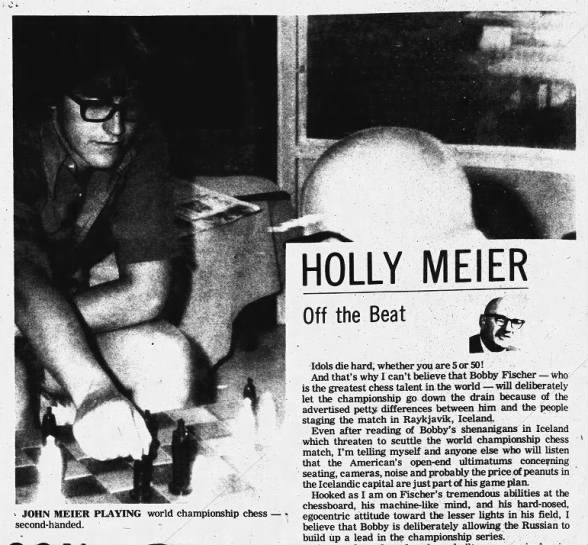 Off the Beat by Holly Meier 14 Jul 1972, Fri Chippewa Herald-Telegram (Chippewa Falls, Wisconsin) Newspapers.com
Off the Beat by Holly Meier 14 Jul 1972, Fri Chippewa Herald-Telegram (Chippewa Falls, Wisconsin) Newspapers.com
Star Tribune Minneapolis, Minnesota Friday, July 14, 1972 - Page 10
Bobby Fischer Phenomenon
Bobby Fischer is the greatest phenomenon for the propagation of chess interest since Lewis Carroll's “Through the Looking-Glass.”
Minnesota has several player who have achieved, or are approaching, master status in chess. Former state chess champion Milton Otteson once beat Bobby Fischer in a tournament chess game.
It would help considerably if your newspaper would run a chess column on a regular basis. The public schools could place chess on a letter basis with sports, thus awarding recognition to mental achievement as well as to physical achievement.
Such chess programs could aid in giving our youth new direction, away from dope, duplicity and deviation.—William R. Jones,Minneapolis.
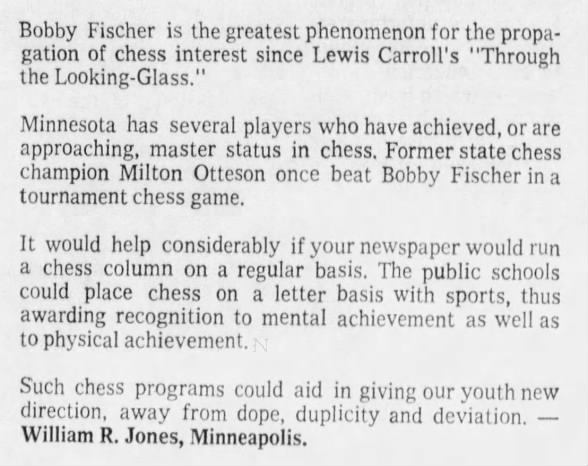 Bobby Fischer Phenomenon 14 Jul 1972, Fri Star Tribune (Minneapolis, Minnesota) Newspapers.com
Bobby Fischer Phenomenon 14 Jul 1972, Fri Star Tribune (Minneapolis, Minnesota) Newspapers.com
The Los Angeles Times Los Angeles, California Friday, July 14, 1972 - Page 7
Fischer Boycotts Second Game; Committee to Rule on Forfeiture by Isaac Kashdan
Bobby Fischer apparently forfeited the second game in the $250,000 world chess championship match Thursday when he failed to appear at the auditorium in Reykjavik, Iceland, because of a dispute over ([men disruptively operating]) movie cameras.
He had complained during the first game that the cameras ([operated by disruptive men, in crews as large as three men, positioned a mere 15 feet/5 meters from Fischer to disrupt the match while it was in progress]), used for television coverage of the match were distracting him. ([And that's what the Soviet hired those disruptive men to do, and when Fischer demands they're shut down, voila! The Soviet achieves a black out on coverage of its humiliating defeat.])
Under agreed rules of the match, he ([Fischer]) had the right to object and to demand removal of the cameras if they disturbed him. But such a protest must be made formally and in writing to the tournament director or to a special appeals committee formed for the match.
No protest, formal or otherwise was made in writing and after world champion Boris Spassky appeared on time and waited the required hour for the challenger to appear, referee Lothar Schmid declared the game forfeit.
Later, however, officials of the International Chess Federation said they had discovered that Fischer was not aware that the protest had to be made in writing and had assumed his oral protest would be sufficient.
The special appeals committee will meet at 10 a.m. today (Icelandic time) to consider the case. It could rule that Fischer's oral protest was sufficient—in which case the forfeit would be nullified and the second game of the 24-game match would be played Sunday.
It could also decide to sustain the forfeit—in which case Spassky would have a 2-0 lead in the match.
In either case, either player could still appeal the decision to the International Chess Federation for final action.
Members of the Icelandic Chess Federation, which is sponsoring the championship match, and representatives of Chester Fox, who holds the television and film rights, will meet with the appeals committee.
At first it was feared that Fischer's forfeiture of the second game might signal the end of the long-awaited encounter between him and Spassky.
Latest Controversy
The dispute over ([disruptive men hired to interfere with the match while in progress and blow Fischer's concentration who were operating the]) cameras was only the latest of a long series of controversies that have plagued ([by and for]) the match organizers for months. Fischer failed to show up July 2 when he was supposed to play the first game, but was granted a delay.
Dr. Max Euwe, president of the International Chess Federation ([under Soviet coercion in a childish conniption fit, demanding apologies while refusal to admit guilt for the months of scheming meddling or, for choosing a malevolently racist and anti-American hovel as the venue of the tournament who has admitted again and again, it cannot even afford to host the venue without dependence upon having unethically sold photography rights out from under Constitutional law!]), later admitted that this delay was contrary to the match agreement ([which Fischer never signed, due to its unethical nature and so was the promise to offer a “first come, first serve” bid basis, when Belgrade dropped out, and Australia LEGALLY bid $225,000, with a mere $25,000 needed to cover organization expenses… yet, the Soviet rushed in with juvenile antics and childish threats it “would not allow Spassky to play” unless the Soviet got its way to bury the match behind the pleats of the Iron Curtain and to which Dr. Euwe, unethically acceded … among other antics scattered over many months involving corrupt meddling and manipulation by the Soviet]).
If the decision today goes against Fischer, many people who know him feel it is unlikely he will take his seat for the third game. He would be facing a two-point deficit ([which any one with a brain knows this is no accident]) — and he would be playing black. White has an advantage in that it has the first move.
Spassky drew white for the first game. Fischer would have had white in the second, and will have it if the forfeiture is nullified and the Sunday game is designated as the second.
But he would have black again if it officially becomes the third game of the series—and the single game thus far completed is ample evidence that something is wrong with Fischer's play ([try the disruptive, noisy, distractive men in crew numbering up to THREE MEN, stationed 15 feet from Fischer, at the back of the stage, on the roof, all around. In the words of Fischer, what is wrong with Reykjavik? : “…they had these characters there, who instead of having, some kind of video tape film that didn't make any noise, just, nobody around to operate them, just sort of stationless and they just had guys there with film cameras that were worrying, and they were all around me. Making a racket. A nuisance. Too much noise, and visually you could see them moving around.” and according to Paul Marshall the lawyer of Robert Fischer, “Bobby told me, ‘I can't think, it's a distraction.’”]).
His error on the 29th move of that game was one of the worst of his career and made it the easiest of Spassky's four victories over Fischer. The American has never scored over Spassky. ★
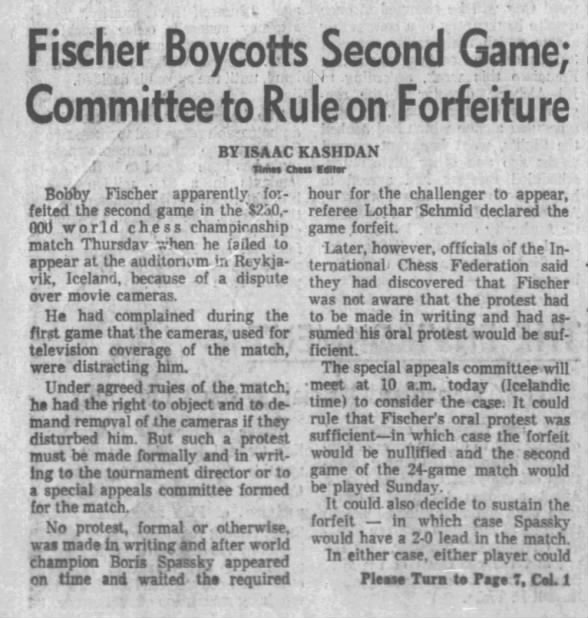 Robert Fischer Boycotts Second Match in Protest Against Men Hired to Disrupt Match With Cameras 14 Jul 1972, Fri The Los Angeles Times (Los Angeles, California) Newspapers.com
Robert Fischer Boycotts Second Match in Protest Against Men Hired to Disrupt Match With Cameras 14 Jul 1972, Fri The Los Angeles Times (Los Angeles, California) Newspapers.com
The Age Melbourne, Victoria, Australia Friday, July 14, 1972 - Page 12
Spassky Moves Into The Lead Commentary by the Melbourne Chess Club
World chess champion, Boris Spassky, finished off the first game of the 24-game match in flawless fashion.
He took a 1-0 lead over American challenger Bobby Fischer when he won the adjourned first game of the world chess title series on the 56th move.
His team of three analysts had confirmed earlier he had a technically won position at the adjournment and at the resumption of play the Soviet champion took full advantage of it.
But Spassky's win was a result of Fischer's uncharacteristic blunder on his 29th move which stunned chess players all over the world.
Fischer's miscalculation may be explained by the tension and drama that has surrounded the match. ([Amen])
Here are the final moves from the adjourned position.
41. PxP KxP
42. K-R5 K-B4
[Fischer cannot save his game with 42. … P-N4 either, e.g., 43. K-N6 P-N5; 44. K-B6 P-K4; 45. B-Q6 and Black must lose a pawn. OR 43. — P-K4; 44. B-Q6, P-N5; 45. K-B6 with the same result.
43. B-K3 K-K5
44. B-B2 K-B4
45. B-R4 P-K4
46. B-N5 P-K5
47. B-K3
Now it is clear Black has lost. Spassky's Bishop dominates the black squares and prevents the advance of Fischer's pawns.
47. … K-B3
48. K-N4 K-K4
49. K-N5 K-Q4
50. K-B5 P-R4
51. B-B2 P-N4
52. KxP K-B5
53. K-B5 K-N5
54. KxP KxP
55. K-Q5 K-N4
56. K-Q6 and Black resigns.
Fischer is now powerless to prevent the fall of his Knight pawn and the promotion of Spassky's last pawn, e.g.;
56. … P-R5
57. K-B7 K-R3
58. B-B5 K-N4
59. B-B8 K-R3
60. B-R3 K-N4
61. KxP
It is interesting to note that if Spassky's QRP had been on QR5 instead of QR4 in the adjourned position Fischer would have forced a draw by retreating his King to QR1 and forcing stalemate.
The second match in the series was due to begin at 3 a.m. this morning, Melbourne time. This time Fischer will commence play with the white pieces.
CAPTION: The fatal move. In striving to avoid the boredom of a draw, Fischer rashly took Spassky's King Rook pawn only to find his Bishop trapped and captured six moves later.
The Post-Crescent Appleton, Wisconsin Friday, July 14, 1972 - Page 2
Even little Oscar de la Fuenta's Moves Aren't Safe from Being Used in the Soviet's Propaganda War
Instead of focusing on young Oscar Fuenta's day in the limelight and chess exhibition, Soviet hacks for hire, lackeys speckled throughout worldwide media were busy manufacturing an all-out smear and defamation campaign against Robert Fischer, painting him as wrong to make legitimate complaints, while the Soviets were throwing up obstacles at every possible opportunity, and in the press desperately hoping to convince the world (the “bandwagon” argument fallacy) that people around the world really didn't want to see Robert Fischer “whip that G#*@% Russian,” which was actually the case. The 1972 hysteria over the match was due entirely to the fact, that the majority of the world really did dislike the tyrannical Soviet Union, THAT MUCH, and savored the hope of witnessing Soviet arrogance taken down a few notches by the young Robert Fischer. Moscow is desperately attempting to portray Mr. Fischer as “touched” and “a prima donna” and “disturbed” and a vicious onslaught of personal character defamation, as the Soviet throws up its obstacles to demoralize young Mr. Fischer who clearly has no intention of letting up to those bureaucrats, off the board.
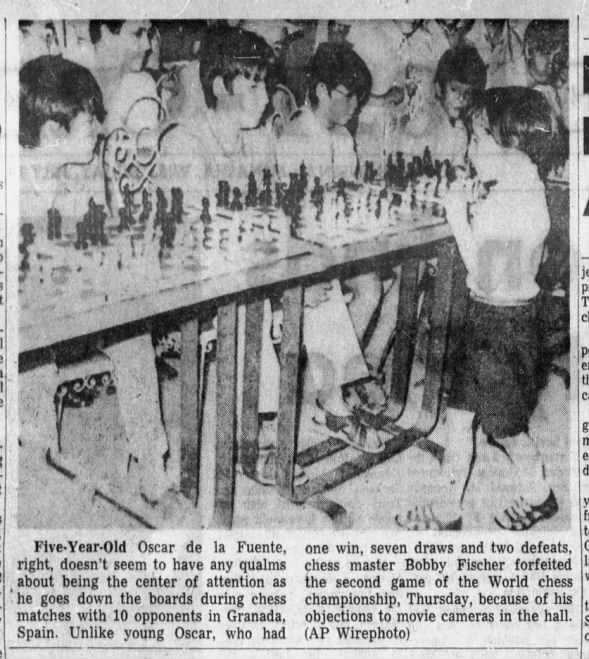 Robert Fischer Boycotts Second Match in Protest Against Men Hired to Disrupt Match With Cameras 14 Jul 1972, Fri The Post-Crescent (Appleton, Wisconsin) Newspapers.com
Robert Fischer Boycotts Second Match in Protest Against Men Hired to Disrupt Match With Cameras 14 Jul 1972, Fri The Post-Crescent (Appleton, Wisconsin) Newspapers.com
The Hanford Sentinel Hanford, California Friday, July 14, 1972 - Page 1
They Play Chess in Hanford, Too
Although the big money and international intrigue was missing, Hanford's James Walker (left) and Patrick Pugh (right) were enjoying a lively game of chess of their own Thursday afternoon. Meanwhile in Reykjavik, Iceland, America's controversial Bobby Fischer was cheated out of a game by Icelandic officials who refused to acknowledge the formally submitted (written) protest presented at 11:58 p.m. by Fred Cramer, beating the deadline by 2 minutes, and qualified Fischer for redress in favor of total removal of cameras. He was illegally denied a fair hearing and the point awarded to the Soviets.
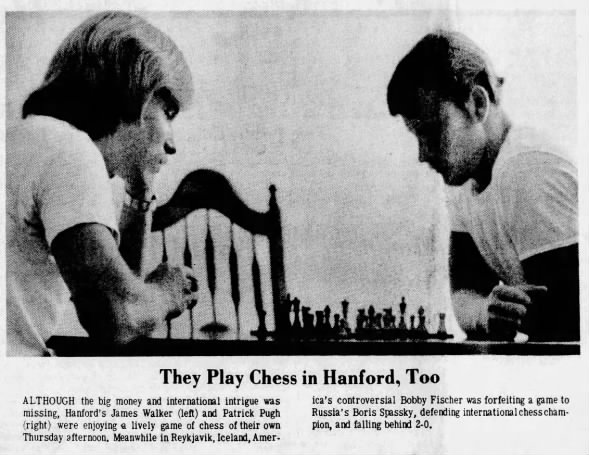 They Play Chess in Hanford, Too 14 Jul 1972, Fri The Hanford Sentinel (Hanford, California) Newspapers.com
They Play Chess in Hanford, Too 14 Jul 1972, Fri The Hanford Sentinel (Hanford, California) Newspapers.com
The Hanford Sentinel Hanford, California Friday, July 14, 1972 - Page 1
Fischer May Get Request
Reykjavik, Iceland (UPI) — The organizers of the $250,000 international chess championship said today they might give in to Bobby Fischer's request to remove closed circuit television equipment from the chess hall, but flatly refused to overturn Referee Lothar Schmidt's decision awarding the second game to Russian Boris Spassky.
Spassky also turned down a personal request from Fischer to replay the forfeited second game.
The committee, after a two-hour meeting, rejected Fischer's protest against Schmidt's ([ILLEGAL]) decision ([since the protest, in writing, was delivered by Fred Cramer 2 minutes before the deadline, and therefore legally binding]) The committee ruling left Spassky, the reigning world champion, with a 2-0 lead.
The group said it would meet again later in the day to take up Fischer's protest against the presence of the ([crews of disruptive men operating]) the television cameras. Fischer boycotted Thursday's game because of the ([disruptive men operating the]) cameras.
“If it all boils down to cameras or no cameras, I guess I will try to remove them,” ([only after the Soviet got a 2 point headstart for itself, depriving Fischer of a fair tournament]) said Gudmundur Thorarinsson, president of the Icelandic Chess Federation.
The next game is scheduled for 5 p.m. (1 p.m. EDT) Sunday with Fischer moving to black just as though Thursday's game had been played. Fischer would have played white—which would have given him the first move—in Thursday's game.
Russian sources said Fischer asked Spassky to replay the second game but Spassky refused.
“In contrast to Mr. Fischer, the world champion abides by the…rules for the match,” said Nikolai Krogius, one of Spassky's seconds. ([Such as “the rules” that required officials to acknowledge delivery and receipt of the formal (written) protest, legal and binding, delivered by Fred Cramer at 11:58 p.m. beating the deadline by two minutes and yet, Soviets who have a bad habit of breaking rules, ignored the petition and steal a point? Fischer too had a point, when he called Soviet officials “a liar.”])
Under match rules, Fischer will not receive any prize money if he fails to complete the match but Spassky presumably would be able to claim his share if he is declared the winner.
The big question remained one that has haunted the championship almost from the beginning: Would Fischer walk out?
Icelandic grandmaster Fridrik Olafsson, managed to get into the suite of rooms where the challenger is staying in a downtown hotel.
“He talked to me about anything else but the match,” Olafsson said. “He lost interest in it six months ago.”
Fischer dropped the first of the possible 24 games to Spassky, who needs 12 points—a win counts one point, a draw one-half point—to retain his title. Time for the second game came and went Thursday and Fischer did not arrive. Aides said he stayed in bed to protest the ([disruptive men hired to operate the]) television cameras.
At the appointed time, 5 p.m., Spassky was in the hall. Promptly at 5, Schmid started the time clock. There were 60 minutes of hushed silence while everybody waited for Fischer.
Andrew Davis, one of Fischer's lawyers in New York, put through a call at 5:30 p.m. — when there was still 30 minutes till Fischer's deadline — to Richard C. Stein, lawyer for the owner of the TV and film rights and asked Stein to remove all cameras for Thursday's game and give Davis time to fly to Iceland and discuss the matter in detail.
Stein said he agreed and even made out a written agreement backstage in the hall. Fischer was told via telephone that such an agreement existed, but the American did not respond, Stein said.
Father William Lombardy, Fischer's official second and former world junior chess champion, met newsmen who tried to get into Fischer's hotel suite after the game and told them “the situation is very serious.”. ★
Detroit Free Press Detroit, Michigan Friday, July 14, 1972 - Page 1
Export of Prize OK'd
London—(UPI)—Investment banker James Slater has Bank of England permission to export his $125,000 contribution to the prize money in the international chess championships in Reykjavik, Iceland, banking sources said Tuesday.
Slater was unavailable for comment.
British law requires Bank of England approval for any resident of the United Kingdom to export more than $750 in one year.
The Pantagraph Bloomington, Illinois Friday, July 14, 1972 - Page 4
Fischer's Moves Purposeful
Editor, The Pantagraph,
I read with interest your comments on the world's chess championship and the American master, Bobby Fischer. There are some important aspects of the game of chess as well as some aspects of Fischer's personality that you may have overlooked.
First, chess, as played by International Grandmasters is more than a game. It is an art which requires that conditions for the matches be perfect. Because of the pride the players (most notably Fischer) take in their art, the high prizes now offered (thanks again to Fischer's efforts) and the International prestige on the line, disagreements such as have occurred are not mere quibbling at all.
Fischer's current protest was aimed at the organizers of the tournament, perhaps to show the big-wigs that run the game that the most important people in chess are the players. When his legitimate protest threatened damage to the game, the people of Iceland, the American chess image and additionally threatened Russian-American relations, Bobby did the honorable thing, and relented.
The Pantagraph comment implies that the game of chess does not have much of a following in America. I disagree. While chess does not rival football or basketball for publicity and participation, it is a growing art from in this country, and I feel that a daily or bi-weekly column on chess should be offered in your paper to supplement the growing interest in chess in our area.
Stephen E. Brown, Manchester Hall, Normal.
Enterprise-Journal McComb, Mississippi Friday, July 14, 1972 - Page 9
Spassky and Fischer Posed in First Match
Dwarfed by giant screen above them.
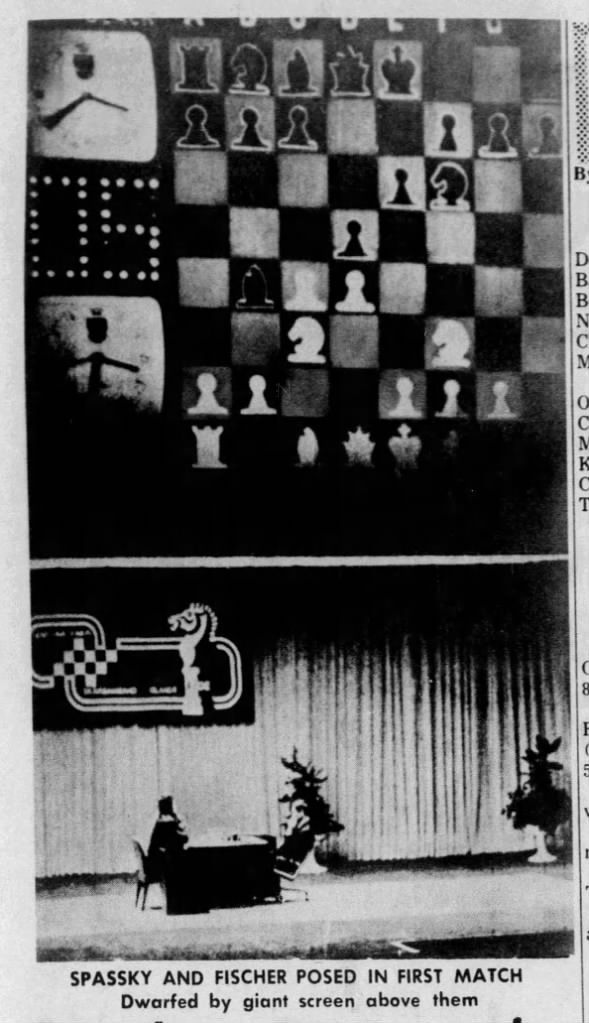 Spassky and Fischer Posed in First Match 14 Jul 1972, Fri Enterprise-Journal (McComb, Mississippi) Newspapers.com
Spassky and Fischer Posed in First Match 14 Jul 1972, Fri Enterprise-Journal (McComb, Mississippi) Newspapers.com
The Charlotte Observer Charlotte, North Carolina Friday, July 14, 1972 - Page 7
Chess Is Politics, War Condensed Under Rigid Rules
Washington Post-Los Angeles Times News Service
Washington—When you know the moves in chess you're almost in the same position as someone who knows the functions of the players on a football team: you don't know much of anything.
It is simple enough to learn the moves, but then you discover the real question is “which move when?” Furthermore as in football, you need a special language to talk about it.
Here is a little course in that language.
— Checkmate. The object of the game is to checkmate the enemy king. That is, to be in a position where you are about to move one of your attacking pieces onto his square and he can't prevent it since he is unable to move into or remain in any piece's line of fire.
It is good to remember that chess, probably of ancient Persian origin, represents a war between two kingdoms in which two armies consisting of infantry (pawns), cavalry (knights), fortress outposts or armored elephants (rooks), political intriguers and fifth-columnists (bishops) and a general (the queen) fight each other to get at the opposing king. Though the armies may be decimated, the king itself never is actually killed but is captured, rendered immobile.
—The center. All chess strategy has to revolve around the center one way or another. Once you control the center, you can pivot to either enemy flank, and usually the very first moves of the game, with the center pawns, are attempts to concentrate force on those four central squares.
Sometimes a player will deliberately freeze the center, jamming pawns in there so nothing can get through, and then mount a flank attack. But he must still watch the center for counter-pressure.
—Openings. For centuries, players have been trying various ways of developing, or playing, their pieces quickly to form a coherent attack. Books have been written that simply list hundreds of opening variations. Serious players memorize many of these, saving much time in match play. Often they are named for their inventors or for regions where they were first fashionable.
Openings are very much a matter of fashion. One of the earliest recorded, the 16th-century Ruy Lopez, made a comeback after generations of neglect. (It is rather as if the Los Angeles Rams revived the old Statue of Liberty play.) But it works, for new lines of play have been discovered following the characteristic first three or four moves of this opening.
There are openings called “defenses,” which offer a good reply for black, which plays second, in a given situation. There are openings called “gambits” which involve sacrifice of a pawn to obtain advantage in territory but which are almost unknown in modern chess where the tiniest weakness will be exploited instantly.
—Open or closed game. Different openings have different purposes. Many that start with the king's pawn, for instance, lead to a fast, brutal, “open” game with pieces being exchanged right and left. Bobby Fischer almost always opens with the king's pawn when he has white. On the other hand, many queen-side openings lead to slower development, subtle webs of power, slow strangulation.
—Combinational or positional play. Paralleling the open and closed game are two contrasting styles of play. The combinational, is essentially tactical — featuring a house-of-cards effect that often begins with a surprise sacrifice.
The positional is basically strategic, where a player may actually sacrifice a piece just to gain access to a given square, or to open a vital diagonal for his bishop or file for his rook, or to provoke a weakness in the enemy's pawn structure.
Strong and weak squares. Wilhelm Steinitz, an early world champion who developed a theory of strong and weak squares, but all you need to know for now is that if a player has lost his white bishop, for example, or has several pawns frozen on black squares where they cannot bear on the white, then clearly that player is weak on the white squares, a fact that his opponent should exploit, if in fact he did not deliberately create the situation himself. ★
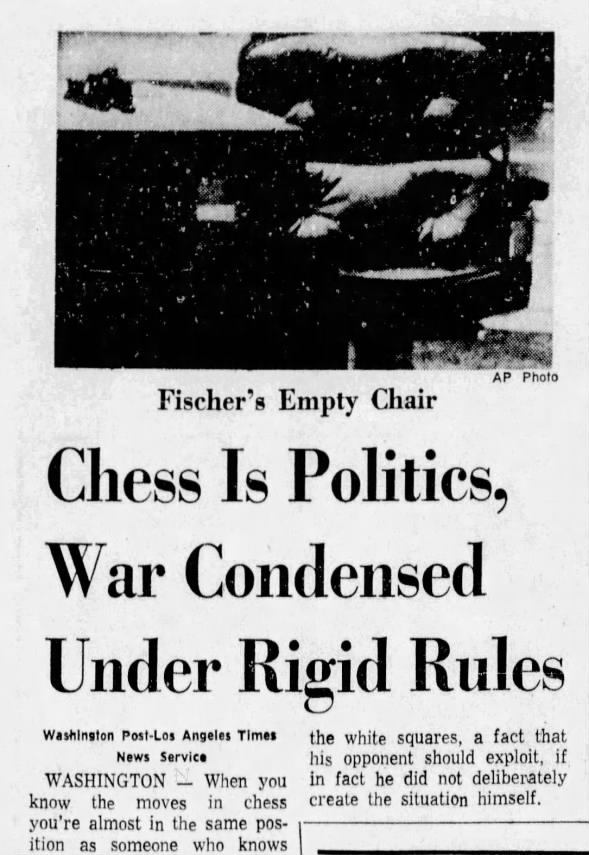 Chess Is Politics, War Condensed Under Rigid Rules 14 Jul 1972, Fri The Charlotte Observer (Charlotte, North Carolina) Newspapers.com
Chess Is Politics, War Condensed Under Rigid Rules 14 Jul 1972, Fri The Charlotte Observer (Charlotte, North Carolina) Newspapers.com
The San Francisco Examiner San Francisco, California Friday, July 14, 1972 - Page 2
Chess Row: Fischer Risks Heavy Loss
Reykjavik, Iceland — (AP) — Bobby Fischer charged today that tournament organizers seemed to “upset and provoke me” deliberately ([Well Mr. Fischer, you are trapped in the Soviet's hand-picked, Anti-American Racist haven, so of course they are. That's why Russia selected Reykjavik, Iceland. It's “row” over the NATO base at Keflavik. Maybe the rest of Americans will figure this out in about… 50 years.]), but an appeals committee rejected his request to replay the chess game he forfeited to Boris Spassky of Russia. ([Although the facts are, the valid “formal written protest” as required according to the rules, were in fact, submitted before the deadline and yet, these officials rejected it, out of hand, illegally, because they don't care about fairness or ethics. For Soviets, “Winning” is all that matters.])
The world champion from the Soviet Union was awarded second game yesterday in the championship match when Fischer refused to appear, staying in his hotel suite, because he objected to ([disruptive men operating]) three moving picture cameras in the hall ([which according to USCF's Col. As Col. Edmondson, who had a hand in drafting the agreement, reiterated, “Fischer had the right to bar the cameras if he felt they were disturbing his concentration.” But Fischer's rights and the rules, were ignored by Icelandic officials]).
Thus Spassky, who won the first game, is 2-0 in the 24-game series. He needs 10 more points to retain the title. A victory counts one point and a draw half a point.
Fischer agreed to go ahead with the match if the cameras ([the disruptive crews of men operating the cameras]) were removed, although it was the movie and TV payments that allowed the Icelandic Chess Federation to offer a record $125,000 purse to the two players ([and if that's actually so, how did Australia bid $225,000 with only $25,000 going to organization expenses and 200 grand for prize money… and no mention of movie/photography rights to “stay afloat”. If Iceland could not afford a mere $125,000, it should've never cast it's bid. And what's to become of all that gravy take at the gate? No accounting on that holdout from the players?])
Gudmundur Thorarinsson, president of the ICF, said that if the match was stopped by Fischer's disqualification ([disqualification?? and why? Because Fischer legally protested disruptive camera men, just as the rules permitted, with the American delegates producing a formal protest in writing, before the deadline. And yet chose to break the rules and ignore it? Who is creating all these uncertainties, dilemmas and unwarranted drama, except the organizers and the Soviet]) the organizers would not pay the loser's share. This meant that Fischer could not only lose his chance at the title but big money. ([We know there was talk months earlier, from April 15, 1972 of the Soviet even then plotting to “disqualify and replace Fischer” so this comes as no surprise])
As the loser he would be entitled to $46,875 from the ICF, $45,000 from a purse of about $120,000 offered by British financier James Slater, and $27,500 from the TV and movie rights.
In a seven-page letter to Lothar Schmid, the chief referee, the American said he was told the cameras would be silent and invisible—but “nothing could have been farther from the facts.”
He previously had told Schmid that although … /snipping hearsay and bias ([and Fischer's lawyer, Paul Marshall stated “Bobby told me, ‘I can't think, it's a distraction.’” Golombek described a man on the roof, and Schonberg describes a distractive crew of three men, and later, Fischer recalled in his own words to Johnny Carson 11/1972: “…they had these characters there, who instead of having, some kind of video tape film that didn't make any noise, just, nobody around to operate them, just sort of stationless and they just had guys there with film cameras that were worrying, and they were all around me. Making a racket. A nuisance. … Too much noise, and visually you could see them moving around.” — Robert J. Fischer])
Fischer declared that when all the camera equipment had been removed “I will be at the chessboard.”
A four-man committee voted 3-1 to reject Fischer's request for a reply, said Gudmundur Arnlaughsson, of Iceland, assistant referee who served on the committee.
“We've agreed to support Schmid's decision,” he said. “Three of us felt that it could not be done otherwise. There was one against.” ([Naturally, because Iceland is notorious in its chauvinist hostility toward Americans.])
Opposing was Fred Cramer, of the U.S. Chess Federation, and an associate of Fischer. The other members were Baldur Moller an ICF official, and Nikolai Krogius, a Spassky aide.
Andrew Davis, Fischer's lawyer who arrived in the morning from New York, appeared upset by the ruling. Asked if Fischer would appear for the third game Sunday, he replied: “I can't comment on that.”
Red Deer Advocate Red Deer, Alberta, Canada Friday, July 14, 1972 - Page 17
No Matter What, Spassky's Rich
Moscow (AP)—No matter what, Boris Spassky is going to return to his Communist homeland a rich man, even by capitalist standards.
But the Soviet government and the National Chess Federation have apparently yet to decide whether the Russian chess champion can keep the earnings from his Reykjavik encounter with American challenger Bobby Fischer.
Viktor Baturinsky, director of the Soviet Chess Club, said the allocation of Spassky's prize money “has not been decided.” He made it clear, though, that the chess club feels entitled to a good chunk of Spassky's winnings.
It is illegal for a Soviet citizen to possess foreign currency. But the regulation is waived for some of the Soviet elite permitted to travel abroad and earn Western currency.
Even if he loses, Spassky, 35, will return home with about $119,375. At the official exchange rate that's 98, 245 rubles and 63 kopeks, or more than the average Russian worker can make in 78 years. And if he wins, Spassky gets estimated $180,625.
Spassky probably will convert a substantial amount of his prize into certificates that enable him to shop at the special food and consumer goods stores established for the Soviet elite in Moscow ([Already, the elite Soviet Capitalists are speculating on how to divide up the spoils between themselves, and the fate of Spassky's share of the prize hangs in the balance, if he fails to win this tournament, as harsh punishment and repressive measures, will surely follow. Where's all that so-called “Equality” under Soviet “Socialist” Imperialism?]) and Leningrad, his home town.
Edmonton Journal Edmonton, Alberta, Canada Friday, July 14, 1972 - Page 61
Iceland Match Sparks 'Rush' on Chess Sets
Unlike the hula hoop, the yo-yo, or even Monopoly, chess is the sort of pastime that seems to be immune to fads.
Nevertheless, interest in chess has picked up in Edmonton in recent weeks — starting about the time the Fischer-Spassky match in Iceland began to receive publicity.
Downtown stores selling board games report what might be described as a “rush” on chess sets beginning about a month ago. (In the chess-set business, a rush is a sudden sale of more than two or three sets at any time other than Christmas).
The sudden, if modest, enthusiasm was “strictly stimulated by the game” (between Fischer and Spassky), was the opinion of a Bay employee, who reported increased sales at the downtown store.
Crazy Eddit's Adult games, a specialty store on the Boardwalk downtown, reported a similar increase in sales.
“The cover story on Fischer in Life Magazine helped a lot,” said a clerk in Crazy Eddie's.
Hurtig's bookstores downtown and at the university campus have noticed increased turn-over in their stocks of chess books — both how-to books and accounts of Masters Tournament games.
“It would seem that the Fischer-Spassky match has sparked an interest,” said a mildly surprised employee of Hurtig's downtown.
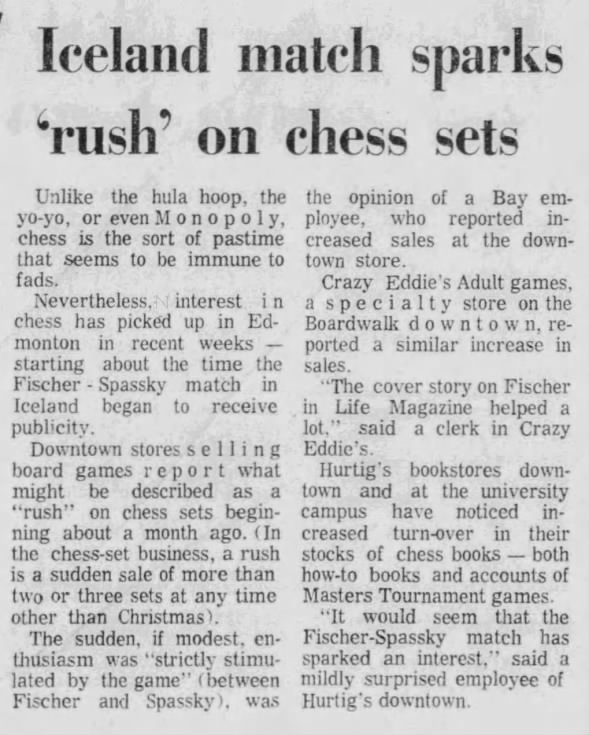 Iceland Match Sparks 'Rush' on Chess Sets 14 Jul 1972, Fri Edmonton Journal (Edmonton, Alberta, Canada) Newspapers.com
Iceland Match Sparks 'Rush' on Chess Sets 14 Jul 1972, Fri Edmonton Journal (Edmonton, Alberta, Canada) Newspapers.com
Alton Evening Telegraph Alton, Illinois Friday, July 14, 1972 - Page 3
SIU Professor Tackles 21 Chess Players by Pat St. Clair. Telegraph Staff Writer
Dr. Cameron Meredith, a psychology professor at Southern Illinois University, played 21 games of chess simultaneously for five hours Wednesday evening at Hayner Public Library and managed to win about half.
It may not have been the Bobby Fischer - Boris Spassky contest for the world chess championship now going on in Iceland, but some experienced chess players came for the contest.
“I decided to take on the challenge to increase the interest in the new chess books offered at the library,” Cameron said.
“I never expected such a crowd to show for the event. There are some very excellent chess players in the area.”
Dr. Cameron played for five hours without a break and without sitting down. All of his 21 opponents had a lot of time to think about each move and determine their strategies while Cameron move from game to game.
After about 2½ hours Cameron began to tire and lost his first game to Rodney Bowie. The first person to checkmate Dr. Cameron was Stephen Jianakoplis.
His opponents ranged from a 7th grade student to several middle-aged men.
With the current interest in the game of chess, thanks to the Spassky-Fischer match, the library is planning a chess club which can meet at the library, according to Robert Black, coordinator of adult services at the library.
“The only chess club in Alton is the one at Alton High School, but it is only for their students,” he said.
Most of the books on chess have been checked out of the library since the Wednesday evening contest.
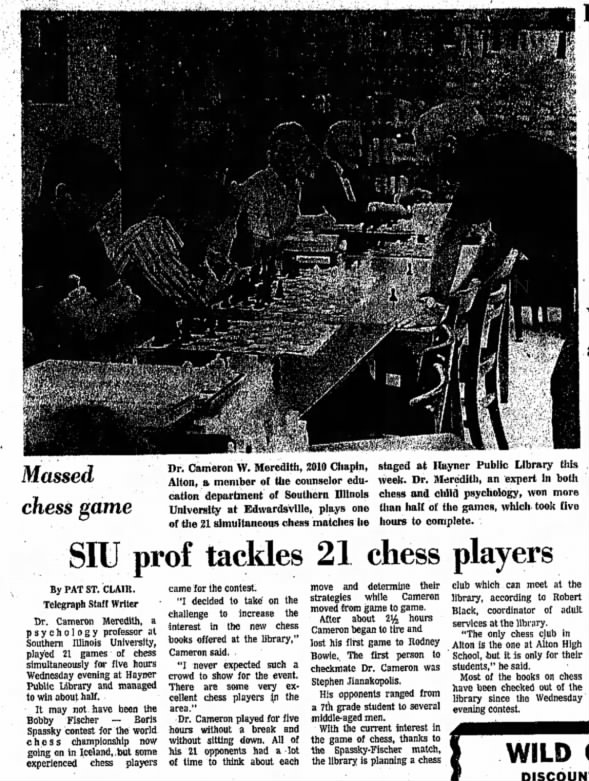 SIU Professor Tackles 21 Chess Players 14 Jul 1972, Fri Alton Evening Telegraph (Alton, Illinois) Newspapers.com
SIU Professor Tackles 21 Chess Players 14 Jul 1972, Fri Alton Evening Telegraph (Alton, Illinois) Newspapers.com
The Los Angeles Times Los Angeles, California Friday, July 14, 1972 - Page 1
Chess Session
Chester Fox, who holds the filming rights to world championship chess games, meets with Bobby Fischer, right, to discuss the U.S. challenger's complaints about movie cameras.([“Under agreed rules of the match, [Fischer] had the right to object and to demand removal of the cameras if they disturbed him.” -Col. Edmondson, USCF])
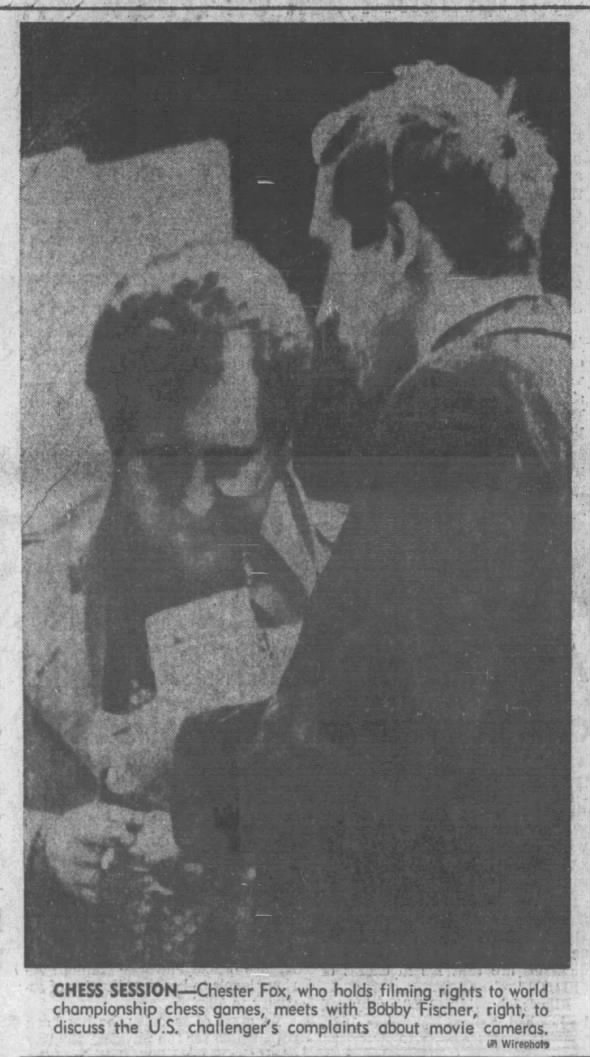 Robert Fischer Boycotts Second Match in Protest Against Men Hired to Disruptively Operate Cameras 14 Jul 1972, Fri The Los Angeles Times (Los Angeles, California) Newspapers.com
Robert Fischer Boycotts Second Match in Protest Against Men Hired to Disruptively Operate Cameras 14 Jul 1972, Fri The Los Angeles Times (Los Angeles, California) Newspapers.com
Beckley Post-Herald Beckley, West Virginia Friday, July 14, 1972 - Page 4
 Fischer's Moves Put Chess in Headlines 14 Jul 1972, Fri Beckley Post-Herald (Beckley, West Virginia) Newspapers.com
Fischer's Moves Put Chess in Headlines 14 Jul 1972, Fri Beckley Post-Herald (Beckley, West Virginia) Newspapers.com
Fischer's Moves Put Chess in Headlines
After months of moves by Bobby Fischer of the United States and Boris Spassky of the Soviet Union over where, when and how to hold a chess match as well as the how much — the match itself will be anticlimax.
If he has done nothing else, Bobby Fischer has done more for chess than any man since Lewis Carroll. Customarily a chess match raises as much popular interest in this country as the annual meeting of beekeepers or a seminar on the teaching of Esperanto to the Incas. This time there is a difference, and mostly it's been Bobby.
The Russians deserve some credit. For years the Soviets haven't just held the title; they've owned it. Until Bobby Fischer came along, a world chess match was truly a case of Russian roulette.
THIS TIME FISCHER stole the headlines before the sedentary match got under way. Take his insistence on money. ([That he, Fischer refused to allow the Soviets to deflate, devalue the value of the match when Argentina, Mexico and Australia were offering between 150,000-225,000 dollars to host the match, offering prize money as high as $200,000? And why shouldn't Bobby resist efforts of the Soviet to bury the match?]) He acted so American.
Spassky was in there trying, but his nyet had little bite to it. He couldn't engage in yak-yak without asking Moscow's permission.
The way he walked out of the first scheduled meeting resembled a poor road version of the act Andrei Gromyko used to stage so regularly in the United Nations, but the way the two were checking each other it seemed unlikely they would ever be mated.
Compounding their cold war was that their chosen arena was Iceland. Chess players are like that. Olympians choose places like Tokyo and Munich, regular tourist stops, but the chess federation ([whose upper echelons is heavily tilted in favor of the Soviet Union]) only takes Iceland ([knowing that it is unreasonably racist and heavily Anti-American, with that hostile atmosphere useful as a tool for the Soviet's aim to demoralize Robert Fischer, and upset his game])
The self-effacement of the game may be summed up by the knowledge that the head of the international federation is a man named Euwe. It's quite possible that chess needs a Bobby Fischer and his emphasis on “Me!” Certainly it's received more attention this year than ever in memory.
Belvidere Daily Republican Belvidere, Illinois Friday, July 14, 1972 - Page 4
She Loses Head Over Chess Game
The BDR newsroom may seem a long distance from Reykjavik, Iceland, but Tuesday when Bobby Fischer and Boris Spassky squared off for the first game in their world championship match, we were there.
Actually, in all honesty, we really weren't physically there, but with the use of a chess board and the AP wire machine, we followed enthusiastically as each move was made.
Wednesday, when the first game reached its conclusion with Bobby resigning to Boris in Iceland, Dave was defeating Jane in Belvidere.
Chess has got to be one of the world's greatest games. It requires a great deal of concentration and perception along with a lot of patience.
Even those of us who lack those qualities find chess a most challenging pasttime.
Chess players today don't pursue the game with the vigor of some of those of the past, when according to sagas, the chess board was often the center of treachery, revenge and murder in the 12th and 13th century.
During that time, Rognvald supposedly played King Louis for his head. When the king lost, he smashed his opponent in the face with a bag containing his chessmen. Rognvald rode off in a panic, but his brother stayed on to split the king's skull open.
Chess has apparently come a long way from those medieval times. When Bobby went down to defeat Wednesday, there was no violence. He simply walked out of the room.
However, this is not to suggest that the players don't take the game quite seriously.
Bobby has complained about many distractions which have supposedly hampered his play. They range from hidden television cameras ([actually, cameras operated by disruptive camera men crews, in plain view of both Bobby and the audience where reporters like Golombek and Schonberg reported their eye-witness experiences, including one such camera man, hovering over Bobby with a camera from the roof, distracting his concentration]), the lighting of the room, the chess board, the size of the chess pieces ([Icelandic and Soviet delegation made numerous complaints of their own on these issues and had the chess board rebuilt four times]) to the thickness of the window drapes ([granted, that was Bobby's complaint, to block sunlight.])
This may sound rather inane, but when you consider the size of the stakes for which they are playing and the amount of prestige which is involved, it is quite conceivable that ([Soviet tactics]) have been part of a plan to unnerve ([the American]) opponent.
Perhaps this strategy is worth some consideration on my part.
I could say that Dave defeated me because the news editor was a distracting factor. Or perhaps I could suggest that my loss was due to the fact that we were playing the match at his desk rather than at a more neutral location.
However, if I did contend that my loss was due to factors such as this, Dave might agree to play to the next game any place, any time, and in any manner that was agreeable to me.
If this were to happen, the truth would come out. Dave is the much superior chess player. He would defeat me under any circumstances … and I wouldn't want everyone to find that out.
Maybe I should borrow a tactic from King Louis and simply hit Dave over the head with the chess board after I go down to defeat … or at least pelt him with a few of the chessmen.
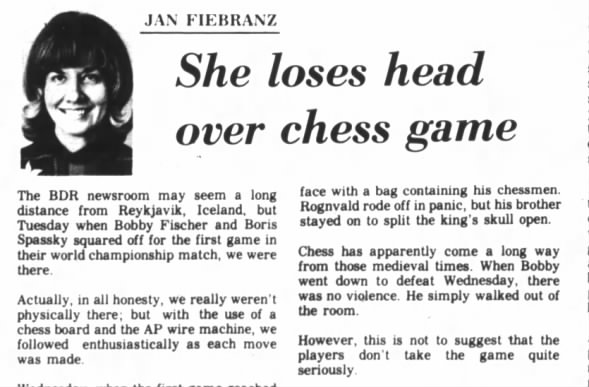 She Loses Head Over Chess Game 14 Jul 1972, Fri Belvidere Daily Republican (Belvidere, Illinois) Newspapers.com
She Loses Head Over Chess Game 14 Jul 1972, Fri Belvidere Daily Republican (Belvidere, Illinois) Newspapers.com
The Philadelphia Inquirer Philadelphia, Pennsylvania Friday, July 14, 1972 - Page 5
Action Line
Q: I recently moved to Philadelphia and love to play chess. Do you know of a club where I could play? —Howard Carrasco, Philadelphia.
Become a member. The Awbury Chess Club, Ardleigh and Haines sts., in Germantown has extended you an invitation to join. The 20-member club is headed by Thomas J. Arouni, city chess chairman for the Department of Recreation. […] Chess has picked up in popularity throughout the United States in recent weeks due mostly to the publicity being given to the world championship match in Iceland between the American challenger Bobby Fischer and the Soviet Union's Boris Spassky. Others who are interested in joining…
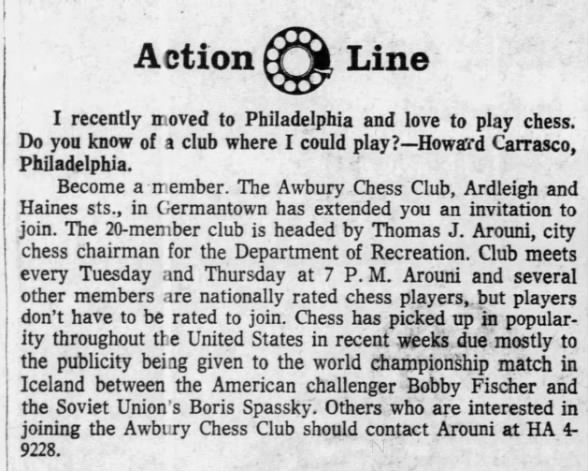 Action Line 14 Jul 1972, Fri The Philadelphia Inquirer (Philadelphia, Pennsylvania) Newspapers.com
Action Line 14 Jul 1972, Fri The Philadelphia Inquirer (Philadelphia, Pennsylvania) Newspapers.com
The Miami Herald Miami, Florida Friday, July 14, 1972 - Page 24
Boris May Live in Style — Win or Lose ([Depending, of course, if his performance appeases Soviet whims… or Nyet])
Moscow — (AP) — No matter what, Boris Spassky is going to return to his Communist homeland a rich man, even by capitalist standards.
But the Soviet government and the National Chess Federation have apparently yet to decide whether the Russian chess champion can keep the earnings from his Reykjavik encounter with the American challenger Bobby Fischer.
Viktor Baturinsky, director of the Soviet Chess Club, said the allocation of Spassky's prize money “has not been decided.” He made it clear, though, that the chess club feels entitled to a good chunk of Spassky's winnings.
IT IS ILLEGAL for a Soviet citizen to possess foreign currency. But the regulation is waived for some of the Soviet elite permitted to travel abroad and earn Western currency.
If the 35-year-old Spassky is anything like other members of the Soviet intelligentsia who earn dollars abroad, he will want to buy himself a Western car.
Prima ballerina Maya Plisetskaya has been paid in foreign currency for her performances in the West and now rides around the Soviet capital in the comfort of a French Citroen. ([Equality?])
And the renowned cellist Matislav Rostropovich motors in a maroon Mercedes-Benz to his country dacha. ([Such indulgence of decadent western consumerism! for the “elite” and “capitalist soviet imperialists” only of course.])
A TENANT at the dacha is the banned writer Alexander Solzhenitsyn, whose books have earned him a fortune abroad. But because of the Soviet regime's anger at the 1970 Nobel laureate, Solzhenitzyn's thousands sit untouched in a Swiss bank.
Even if he loses, Spassky will return home with about $119,375. At the official exchange rate that's 98,245 rubles and 63 kopeks, or more than the average Russian worker can make in 78 years. ([In other words, slavery wages.]) And if he wins, Spassky gets an estimated $180,625.
Should the current world chess champion decide to buy a car, he'll have to pay 100 per cent custom charge before he can bring it home. That won't hurt him too much, since an ordinary domestic Soviet sedan costs 9,200 rubles, or $11,178 at the official rate.
SPASSKY PROBABLY will convert a substantial amount of his prize into certificates that enable him to shop at the special food and consumer goods stores established for the Soviet elite in Moscow and Leningrad ([where's the Equality?! That Caviar is reeking of Imperialism!]), his home town.
The rest of the dollars can be deposited in a Western bank account for future purchases of the French sports shirts he has acquired a taste for, clothes for his wife and other items unobtainable here, such as high-quality tape recorders or Western records.
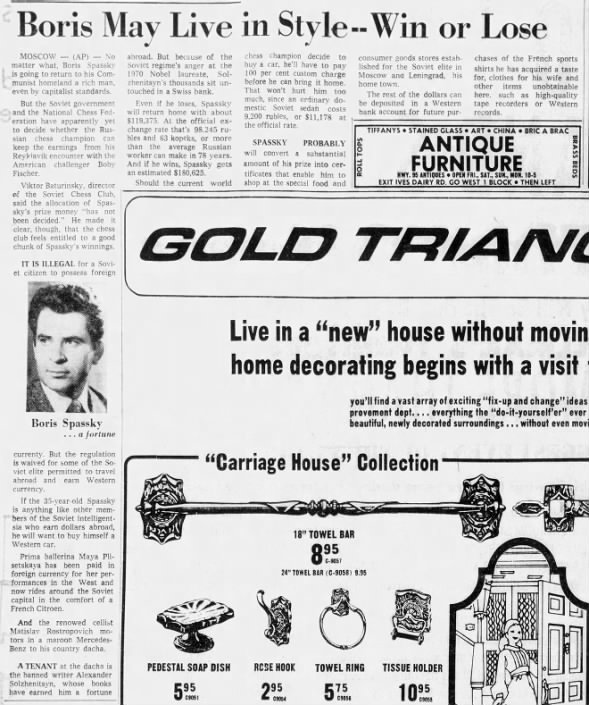 Boris May Live in Style -- Win or Lose 14 Jul 1972, Fri The Miami Herald (Miami, Florida) Newspapers.com
Boris May Live in Style -- Win or Lose 14 Jul 1972, Fri The Miami Herald (Miami, Florida) Newspapers.com
The Pittsburgh Press Pittsburgh, Pennsylvania Friday, July 14, 1972 - Page 13
Here It is Folks —
The famous chess chair, Bobby Fischer wouldn't move a pawn until this Herman Miller chair, designed by Charles Eames, was flown to Reykjavik, Iceland, for the match with Boris Spassky for the world's chess championship now in progress. Fischer paid a wholesale price of $471.60 ($524 retail) for it. Mrs. Cheryl Janusek of West Mifflin “models” the chair at Hende-Jon Galleries, Ross Street. Sponsors of the world match have now ordered one for Spassky also.
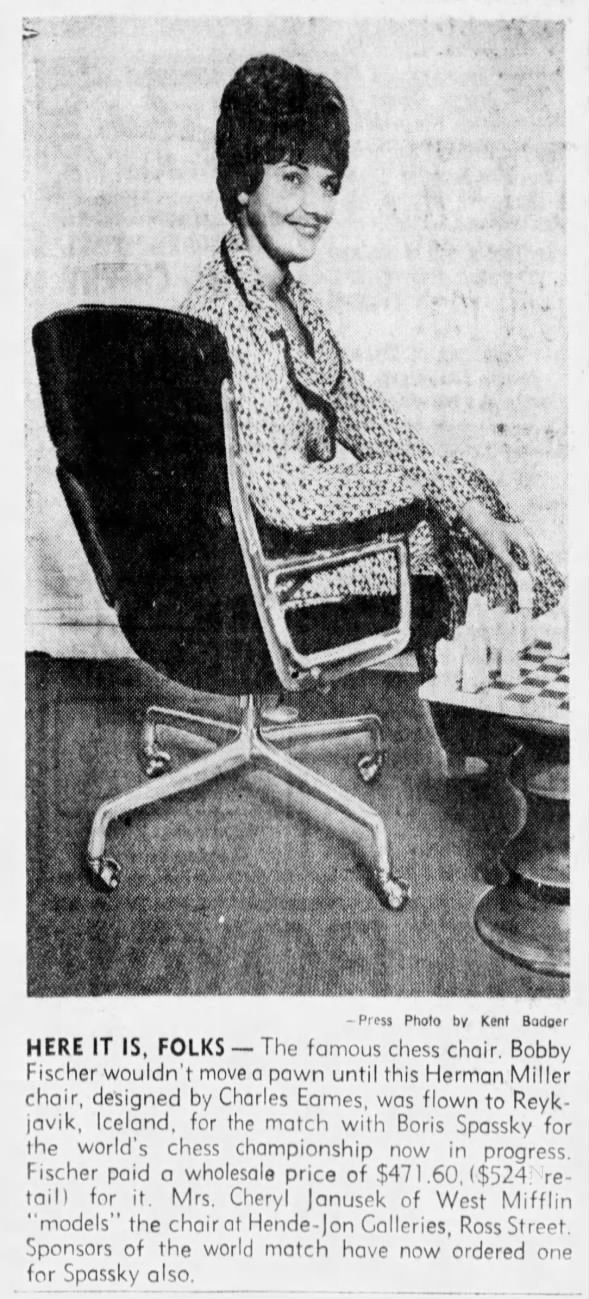 Here It Is, Folks 14 Jul 1972, Fri The Pittsburgh Press (Pittsburgh, Pennsylvania) Newspapers.com
Here It Is, Folks 14 Jul 1972, Fri The Pittsburgh Press (Pittsburgh, Pennsylvania) Newspapers.com














